#but this is on itself a selfish issue formed entirely on my own emotions.
Text
*slides into your DMs* hey babe so are you a "life has been unfair to and filled with abuse" traumatized or a "consumed by loss regret and guilt" traumatized?
#text post#trauma#i saw something and started thinking about this earlier#because i feel like i often see people from the former group around and they're quite bitter. and justifiably so.#but over here in second group corner i'm like yeah man i have no sense of ego anymore i deserve all of the bad things.#and we like actively self-sabotage ourselves as a weird form of punishment too because how dare me be happy.#and logically i know that's bs. and yet feelings operate as they do.#but i know so many people who are so done with people's bullshit and ready to throw down and stand up for themselves#and i'm like damn i admire that fighting spirit.#and from what i can tell from the people i know it's often fueled by their own experiences with people who treated them wrong#but when nobody has treated you wrong but instead you yourself are the cause of all of the bad things then WELL FUCK ME#which is why posts that are meant to like pump yourself up to go stand up for yourself are so alien to me.#or stuff saying that it's totally fine to just be angry and hold grudges at people and i'm like well i don't relate to this at all#if anything it kinda makes me feel worse about myself in some weird way#since i'm the only person i could perceive as hateable.#the whole ''fuck the world i don't owe anyone anything and i should focus on my own happiness first'' mentality is great and all but#almost a direct opposite to what's going on in my head at all times.#i feel like i could dedicate my entire life to try and make the world a better place and i still couldn't justify my existence.#and i don't mean to anyone in particular. just to myself.#but this is on itself a selfish issue formed entirely on my own emotions.#... which just makes it worse.#so yeah.
2 notes
·
View notes
Text
So the answer to all my theoretical mumbo jumbo is just to try to meet people and see what happens, but with dating apps feeling like my only option for that it all seems kind of pointless. Anyway, I’ll indulge myself regardless.
How do I square a desire for an intellectually stimulating, mutually admirational, self-enriching relationship with a desire for domineering, objectifying sex? Presumably in a perfect world you could have both, or you could get them from different places. But I’m not sure I know how to want 1 without the other and that seems to pose problems for my ability to have either.
The weird thing is that in me, these two forms of desire have become coupled despite originating from entirely separate sources. The former has always been at the center of my actual relationships with people, while the latter is firmly entrenched in pornography fueled fantasy.
And although there’s nothing overtly gender specific about the former desire, it seems totally wrapped up with gendered desires and physical attraction to women. It’s based on the former that I develop a crush and start desiring the latter.
I’m at the point where I’m fighting against myself, trying to embrace the possibility of fulfilling my desire for the former at the expense of letting go of its coexistence with my desire for the latter. Even as I should be happy about meeting someone who can satisfy the first desire, the disappointment that she won’t satisfy the desire for the latter gnaws at me. Perhaps I shouldn’t jump to conclusions about this, but holding onto the blind hope that this relationship will facilitate the latter seems reckless at best.
The solution seems to be to go out and look for this kind of a sexual relationship in another context, but that bumps up against my own lack of confidence with that level. The intellectual connection is the one that I’m much better suited to make. If that could help me connect with someone, building the trust to explore my feelings about sex, that seems like it would be ideal. But those kind of intellectual connections have been exceedingly rare in my life. We’re talking about a small handful of girls (prob more to do with my withdrawn character and selfish lifestyle more than the availability of women who would meet my standards, but still a major obstacle).
Leading with the sexual desire would be like trying to lead with my weaknesses rather than my strengths. I’ve never succeeded in connecting with anyone on a primarily sexual level. Plus, it bumps up against my own shame about the way that I experience sexual desire. It’s hard to lead with something where you have no experience or comfort level, but I guess that’s what I’d have to try. I want the emotional connection. Maybe it could be fulfilled this way, not in the way I’m used to.
And as for my discomfort with the sexual desire itself, how do you pursue something where shame and embarrassment overwhelm the desire itself. It just feels impossible and like I have no recourse, no source of support or help to address this. That’s why I want the intellectual connection to be able to have someone to discuss this with, but can discussion without the possibility of physical intimacy actually make a difference? I can “discuss “ these things in writing and it hardly makes a difference.
So instead I’m left with the prospect of going on dating apps and trying to be sexual first and foremost, something I’m not at all comfortable with. And why can’t the sexual relationship have the intellectual component? But leading with the intellectual is just going to narrow the pool of possible partners. Something that already feels like a major issue.
0 notes
Text
Frankenstein by Mary Wollstonecraft Shelley

Read time: 11 Days (intermittent)
Rating: 3.5/5
The quote: Learn from me, if not by my precepts, at least by my example, how dangerous is the acquirement of knowledge and how much happier that man is who believes his native town to be the world, than who aspires to become greater than his nature will allow. — Victor Frankenstein
I find this a difficult book to review. Some things that I need to say on that rating. It might have been higher in a number of different circumstances. If I was reading it in Mary Shelley's time (think early 19th century). If I wasn't delayed in reading it (think reading slump). Or if I was new to it. I studied Frankenstein in year 11 Literature hence the illustrated and annotated edition, studying a text is one way to ruin a book for me a bit. As a bit of an aside, it is remarkably difficult to read this book and not compare it to other things. Its adaptions or works it inspired. Reading Agatha Christie is much the same I believe, reading her Poirot or Miss Marple novels comes across as been there done that to the modern reader. But she did it all first, she formed these devices so prevalent in modern fiction. While it isn't to quite the same extent with Mary Shelley (at least not this book) those thoughts still need to be kept in mind. I will say one thing though the plot and the ethical questions that arise therefrom very much still stand up.
It is very much up to you to deal with the ethics and the questions raised. For some people it will be plain and simple the creature is a monster and humankind was saved by Victor's choice. For others like me, it is more complicated the creature deserved a chance and was driven to his actions. The creature was not much more than a child with a child's knowledge and ability to process, with an adult's body. He was left on his own to fend for himself to develop. If you look at him that way his actions are understandable. I have many more issues with Victor's choices playing god and abandoning his creation. His regret feels more selfish or self-serving than anything else. The second quote I included is from right near the end of the book. Though there is a section where Victor does almost consider aiding his creature is getting a more human existence. That in itself opens up all the what-ifs. Alternatively, just read and not think too heavily about it. Unfortunately, a side effect of studying a book is your way of thinking about it changes.
One thing I had forgotten in the years since I had read this was the intelligent framing of Frankenstein. The framing is letters from an arctic explorer on a ship to a beloved sister. They allow for the story to be told in the first person but with substantial time jumps and some reflective passages. But it does also allow for an unreliable or at least biased narrator. Shelley also makes it clear that the explorer, Walton, has his own life, story, experiences and ethics. This isn't entirely about Victor Frankenstein. It's also about the creature and to a degree Walton. The choice to give the creature a long section explaining his story was a good one. It covers 2 years as concisely as possible. But shows how something of a fully grown man with an infant's compression became so corrupted by hate and vengeance. How his appearance shock people into rash action. Not allowing him a chance at a life.
Just something that needs a bit of a warning there is something in Frankenstein that is akin to incest to modern eyes. When you read this you do need to remember that it was written in the early 19th century a time with extremely different cultural norms. That said given the societal differences the language remains quite readable with only a handful of words truly falling out of favour. Such as paroxysms "a sudden attack or outburst of a particular emotion or activity" (my emphasis). As a side note...which creative fool do I have to blame for corrupting the creature (aka Frankenstein's Monster)? In so many pop culture interpretations he is tall yes but inarticulate and slow-moving. Shelley writes him as superhuman in statute, speed and strength. Articulate and almost polite to Victor.
#philippe munch#mary shelley#mary wollstonecraft shelley#frankenstein#halloween reads#book review#ktreviews#read 2021#illustrated novel#ethics#booklr
0 notes
Text
Elriel/Gwynriel/Elucien Theory Time :)
Ok so in regards to the Az POV chapter, I have some thoughts. This is super long and detailed and also tearing down ships, so uh, beware.
⚠️ACOSF spoilers (duh)⚠️
So I was re-reading the thing and as I was reading the conversation between Az and Rhys, it kind of hit me. I used to be an Elriel shipper until ACOSF, and I was really all for it.
But I don't think they're in love.
See, earlier in the chapter, Az is thinking about how jealous he is of the other couples. We know he isn't very lucky in love, and seeing Elain and her mate and their mating bond upsets him. I think he fancies Elain because she's beautiful and sweet, but I don't think he's in love with her. I think she's another thing he can't have, and he feels frustrated and it only makes him want her more. Because he thinks, why shouldn't he have her? Why is the Mother so cruel as to deny him love? And he thinks, "well all my other brothers have Archeron mates, why don't I? It must be a mistake!"
I think what Azriel's biggest issue is though, is that he wants love so bad, he's willing to risk it all for the first girl he feels attraction too. It also feels relevant that the primary thing we see in his POV is his physical attraction to her, his sexual attraction. We don't see much of how he thinks she's so sweet or so clever or so gentle, but instead how nice her tits are and how badly he wants to kiss and fuck her. I think he doesn't particularly want Elain, and while he likes her, I think what he really wants is love. True love, just like his brothers and friends. He thinks the Mother must be wrong because they both got Archeron sisters while he didn't, and his attraction to Elain makes him wish they were Mates so he could finally have that true love that's entirely his own.
But she's not. And he can't. I think what Azriel wants most isn't Elain. He wants her sexually, and he admires her and has a crush on her, but the thing he focuses on and gives him the most emotion is that she has a Mate and he doesn't, and that everyone does but him. I think he wants someone like Elain and wants to feel happy, but I think he doesn't exactly want Elain. When he thinks of her, he doesn't seem to be truly in love as we've seen other SJM couples are. And sure, it's early, but it's also been like— 2 years. I don't think they're in love sadly, I think Azriel just wants to move on from Mor and finally find love. He has a type, and when he found someone who loosely fit into the mold of his ideal partner, he jumped at it because he's desperate to have someone love him. All his life, he's struggled with self-love and love from others, and I think that it's deeply affected his relationship with love itself.
Physical attraction and desire and interest isn't love. And the idea of her being mated already only makes him mad— that of course the first girl he likes for the first time in 500 years, of course the girl that could help him move on from Mor, is mated. I think that only makes him feel more passionate towards her; and Rhys notes how he seems to think he has a claim to her, when he doesn't. It makes Az angry, not because Rhysand thinks he's being possessive and reckless, but because it's true. He genuinely can't have her.
As for Elain, I think she's far too hesitant to be with him. She reminds me of Daisy in The Great Gatsby, and how she claims to love Jay but she won't leave Tom, or jilt him. Now this is a different situation, because Daisy was selfish and didn't want to give up her comforts and stability and fame. Elain, on the other hand, doesn't seem ready to have a serious relationship with Az. I think she is still severely affected by Graysen's rejection, and is still clearly not over him. I don't think she's ready to accept Az fully and be with him, and I also don't think she's ready to reject her mating bond with Lucien.
I don't know 100% what's going on with Elain, but what I do know is that clearly she is intrigued by Lucien in some capacity. Ok Elriel shippers, don't come for me, but there are several scenes in which Elain seems to want to talk to Lucien, or whatever the heck. But also seems disinterested, like when she dismisses his Solstice gifts and doesn't speak to him.
However, I don't think she's resentful towards him exactly, or at least that isn't the main reason she's like this. While we know he was helping Tamlin lowkey, Feyre and the IC all understood he was on their side, and was their friend. So it seems kind of odd to still bear a grudge against him, but who knows.
But funnily enough, she has yet to reject their mating bond. If she's so disinterested, or hates him so much, why hasn't she turned him down? Mother, she's barely spoken to him at all. I think the obvious reason behind her disdain or distancing from Lucien is her connection to Graysen and her human life. Of all the sisters, Elain has not yet adapted to or accepted that she is Fae— or if she has, she's sure as hell not happy about it. Even Nesta in ACOSF mentioned how she actually likes her ears now, and we know Feyre has totally accepted being Fae. But with Elain, she had the most human connected life of them all, and to have it taken away from her is shitty.
For Elain, her happiness seems to come from a love of gardening, of family, of people. She has very little human things to hold onto, and adding a Mating bond to the mix right as she's made Fae is like she's had all her humanity stripped. She doesn't hate Lucien, she hates the bond. She dislikes that it's chained her to someone and taken away her choices, which we know is a big deal for the sisters after being imprisoned, kidnapped, and Made. I think Elriel is an infatuation, because even though she doesn't love Az, he's helping her rebound from Graysen (and giving her control and power over her love life). He's a choice she (can't really) make, but a choice nonetheless. With Lucien, she feels she has no choice with him, and no control over her obvious attraction I say obvious because mates have a primal attraction of some level to each other , and is probably afraid that accepting the Mating bond will remove any last connections she has to who she used to be, and the human she feels she really is.
But she also hasn't rejected it, because I think she realizes that Lucien is a genuine and kind and hot guy, and that rejecting him would be a stupid idea. He's been very patient and very kind and accepting, and has always given her the freedom of choice when it comes to the bond. I think Lucien is the kind of guy that would be very easy to fall in love with, and I think Elain sees that and knows it.
Also, I think with ACOSF, it feels relevant that Cassian pointed out specifically how Elain looked beautiful in black at the ball, but it looked horribly wrong on her. With SJM the devil is always in the details, and I think it was a clearly accentuated bit of symbolism. Although Elain looks beautiful, the black dress wasn't for her. And although Elriel is very sweet, it won't work out. She won't thrive in the Night Court, or with Azriel. Az doesn't challenge her or meet her as an equal (like all other SJM ships), and they don't push each other to be better or to accept themselves or whatever etc etc.
And I really used to like Elriel, but I think that surprisingly, Elain will be the one who says "stop, I can't do this" to Az. I think she knows she isn't ready, and I think she knows they aren't meant to be. Even if a Mating bond was put in place between her and Lucien, I still think their relationship wouldn't work because they're both too insecure, too closed off, too non-communicative, and too stagnant together to be a healthy or good match. I think with Elain they would struggle to understand each other even if they were fond of each other and can relate on some level, but at its rawest form I think they won't truly be able to be themselves with each other.
With Elain, Azriel's shadows— a key part of him— disappear. While I initially thought, awww that's so cute, she's a light in his life, I soon realized I was wrong. Az's shadows are not just a part of him, they're an extension of him, of his will and subconscious and emotions. So Elain chasing them away, while chasing away the shadows and darkness seems cute, isn't a good thing. Most of the time with shadows, we think "ew bad!" Because they have an inherent connotation of negativity or sorrow or depression or darkness etc etc. And while this is partially true, Azriel's shadows and darkness are a part of him. His sadness and struggles are a part of him. And his shadows aren't just representative of that, they're also a representation of how he overcame his abuse and turned that fire (pun unintended) and anger and trauma into something beautiful and powerful and a weapon. I think they can serve as an armor and a shield, and while that's not good, I also don't think they should fully disappear.
More on that: with Azriel's shadows, we know they're a part of him, right? So I think an important part of self is self-regulation. Rather than be consumed entirely by shadow, or totally exposed to the light, I think he just needs his shadows to be calm and present, but not controlling or hiding. I think the whole "Elain bringing him out of the shadows" bit sounds cute at first, but then you have to think of it like this. In order to be with Elain, he would have to change. He couldn't be a spy or a shadowsinger or a torturer, and he couldn't be dark and introverted. With her, he has to push that aside. Those are key parts of him, key parts that would have a big impact on their relationship. Elain can't be with someone with so much blood on their hands or a history of violence or darkness. We know that, because we know that sort of thing upsets her and she doesn't like it.
Azriel can't just be himself with her, he has to become someone else. And while he's attracted enough to not care, after awhile, that grows exhausting. Being in love and not being your true self, all of it, is exhausting. And while some might argue "why can't he be his true self?!" well my slime, I think we both know that even if we wanted him to, Elain would be silently resigned about it. I don't think— no, I know— Elain can't be with someone like Azriel. Even if they have feelings, even if they have lust or affection, it isn't love. They aren't in love, and they won't work out no matter how much we want it to.
Onto Elain: with Elain, this all ties back to what Cassian said in Hewn City. She looks beautiful in black, but it's wholly wrong for her. The Night Court is wrong for her, and darkness is wrong for her. While some yin-yang relationship tropes can work very well, I don't think this will. She doesn't like the darkness or accept it, and she doesn't want to be a part of it. I think the Night Court is good and happy for her when she makes her own little garden world, and only then, really. It's like living in the middle of the desert and only thinking of the beach: it's not the right place for her.
I think the Spring Court needs her, and I think she needs it. Here's more on that.
So we've seen the set up and execution of the fall of the Spring Court. We know that it's in shambles and is weak and needs a new/better leader than Tampon. I feel like SJM is setting things up for a new book focused in the Spring Court, because in a lot of ways, it's becoming the centerpiece for action in Prythian (aside from the Night Court). I genuinely believe that as Tamlin's second, Lucien will take over the Spring Court as High Lord. He doesn't fit in with Autumn, didn't fit in with Night, and wasn't really a part of Spring. But with Spring, it was where he was happy, where he felt safe, and the home he chose. Chosen homes and chosen families are a big deal for SJM, and I think that Lucien will return to the Spring Court to try and help it, because Mother knows it needs it. I think Elain belongs there, not only because she needs to be in an environment suited to her, but because she needs to heal.
We've seen a theme of helping others heal in order to heal ourselves, and I think a good book idea (and what I think an Elain book would be about), is healing the Spring Court and helping it. Elain is a gardener. She wants to see things grow and blossom, wants to get her hands dirty and dig in! But she can't do that in the NC. I think she needs something new and fresh and blossoming that she can help and tend to, and I think the person that can be at her side for that is Lucien. I think with Azriel, she can't see growth and life and flowers. He's a different kind of person, far too different, and the two wouldn't mesh well. Elain isn't like Persephone and Azriel isn't like Hades; although she's flowers and he's death and they're attracted to each other, they don't fully accept those roles and cross into each other's. Elain could never be a killer or someone who wears black or thrives in a darker place, and Azriel couldn't be someone who is in the full heat of the light and wear bright colors and be cheerful and flowery. In a dream world, yes, but I think in this one, no. SJM loves to create realistic relationships and realistic relationship conflict, and I think we'll see this here. Even though they want it to work, and in theory it should, it won't. I think they know it too. Azriel's shadows vanish when she's around, and Elain struggles to feel comfortable in the darkness and Night Court, and fit in with the others in the black dress that is wholly un-Elain.
I also think that this relationship doesn't bring development to the table. The forbidden love concept is adorable and a trope I love, but this love isn't one that will push them to grow. Azriel can feel loved and happy, but can he feel fully accepted? Can he stop being ashamed of his shadows, of his violence? Of who he is? Can Elain break out of her shelf and be more assertive, and truly grow and change? Can she be herself and be happy? The answer is a sad no. Their relationship is sweet and cute, but it won't truly work. I genuinely believe Lucien is a better match for Elain, and while the Cauldron isn't always right (like Rhysand's parents), it usually is. If he isn't, then I'm all for independent Elain.
Now onto the moment you've all been waiting for: who should Az be with?
Gwyn. :)
#acosf spoilers#gwynriel#a court of silver flames#elriel#elucien#gwyn berdara#gwyn x azriel#azriel#acotar#acotar theory#acotar thoughts#acosf
400 notes
·
View notes
Text
Informalities - Éomer x reader
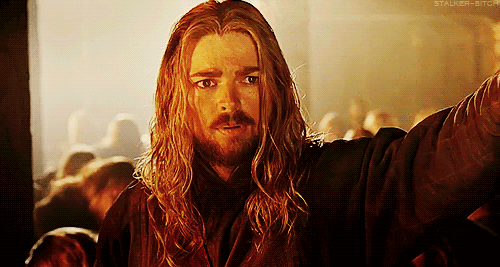
Request: “Eomer x reader fic where the reader is from our world and Eomer listens to the stories the reader says of our world and he thinks that it is a grand place and so when they are finally getting together, Eomer feels kind of insecure cuz he feels he'll never live up to the reader's "standards" and the reader says that they are insecure because he is a prince and she has nothing"
Tags: @thewhiteladyofrohan
Warnings: mention of battles and death, about 2,200 words
A/N: Hoppy Easter lads and lasses, we are back from a many month writing hiatus. Hope y’all enjoy, I’m glad to be here :)
You genuinely had no idea how you’d ended up in Middle Earth.
It was one of those fever dream situations - one moment you were falling asleep in your own bed, and the next you were waking up at the bottom of a tree, surrounded by many bearded and concerned looking men.
Of course you’d been startled and so, so confused, but it had only taken you a few moments to recognize the characters from one of your favorite stories, and then you’d fully accepted your new reality.
By the time you first encountered the fellowship, they had already lost Gandalf at Moria and passed through the realm of Lothlorien. They were traveling in their fancy elvish boats when they’d spotted you from the river. You were extremely grateful for that - who knows what would’ve happened if the Uruk-hai tracking them had found you first.
Boromir and Gimli were quite intimidated by your presence, having been brought up in traditions that designated men for warrior roles. Aragorn and Legolas were much more accepting (female elves were just as badass as any male elf or man, and both of them knew that). The hobbits had all taken an immediate liking to you, and you’d been devastated to lose them during the Uruk ambush. Of course, this only gave you a stronger drive to track them into Rohan with Aragorn, Legolas, and Gimli.
It was there that you met Éomer for the first time, after his riders surrounded your small group of assumed invaders.
He was handsome, there was no denying that, and you found his decision to protect Rohan even in exile extremely brave. He’d been startled by your presence (a group including a dwarf, an elf, AND a woman must’ve been an oddity for him), and thus had talked primarily with Aragorn, but you could not shake the way his eyes locked with yours as he offered you his condolences about Merry and Pippin.
You figured you’d never see the handsome blonde again, glumly complaining to Gimli about it several times throughout Rohan.
Thus, you’d been overjoyed when he arrived at the Battle of Helm’s Deep - half because he was saving your asses from almost certain death, and half because you’d get to see his face and hear his voice again.
You followed Aragorn after the battle, searching for Gandalf in the celebrating crowd. It did not take long, with his bright white robes being quite easy to pick out.
“Gandalf!” you screamed gleefully, weaving between the people around you to get to the smiling wizard.
“It is good to see you, (Y/n),” he said as you embraced him.
“Oh, it’s even better to see you,” you said.
“I have to agree with (Y/n),” Aragorn said from behind you. You pulled back, allowing Gandalf time to greet your friend, and quickly caught sight of a familiar face.
He had been laughing with some other men when his gaze fell on you, eyes locking with yours for the second time. You smiled a bit and offered an awkward wave, face flushing as he flashed you a smile.
“Ah, (Y/n), this is Lord Éomer, current heir to the throne of Rohan,” Gandalf said, noticing the two of you staring at each other.
“We’ve met before,” he said, walking towards you
“Indeed we have,” you replied as he stopped just in front of you. “It is a pleasure to meet you, oh-future-king,” you said, bowing a bit.
You could hear Aragorn slap his forehead from behind you and grinned.
“She’s not from around here, so do forgive her manners,” Aragorn said.
“Or lack thereof,” you added, straightening yourself once more and looking at Éomer’s amused face.
“I appreciate the informality,” Éomer grinned. You spun around and pointed at Aragorn.
“See? Someone appreciates me,” you accused.
You were extremely happy to meet Éomer. It’s not that you didn’t adore Aragorn and Legolas and Gimli, but they were also the only people you’d been around for quite a while. It was exciting to make a new friend, especially one so handsome and charismatic.
The two of you spent the entire ride to Isengard delving into each other’s lives, from childhoods to secret fears to favorite foods. Obviously, the two of you had led quite different lives, and he was fascinated by the world you had come from.
“These cars you speak of, are they like horses?” he asked.
“No, they’re much faster,” you replied. “They’re more like a carriage, since they have space for several people inside.”
“But it moves without a horse?”
“Yup!”
“Who steers in then?”
You were grinning ear to ear at the look of bewilderment on his face.
“One of the people inside,” you answered. “There’s a wheel to control which direction you go and pedals on the floor to control the speed.”
“That sounds terribly complicated,” Éomer said, brows furrowing.
“It’s not too bad,” you said, “I was even pretty good at it.”
Éomer shot you an alarmed look.
“You used to steer these...these things?” he asked incredulously. You laughed and nodded.
“You have to be taught how to do it,” you explained. “It’s not like they throw you into it without any preparation.”
“It still sounds extremely dangerous,” he decided.
“I did break my arm in a crash once,” you said thoughtfully. He gasped.
“You can crash them?”
Éomer had quickly become one of your favorite people, which only made the continuous battles over the fate of Middle Earth even more stressful. You were terrified he would ride into a fight and never return, and even more terrified of what that meant.
You’d searched for him for hours after the Battle for Minas Tirith, heart growing more and more heavy as you continued. Every person you asked had no idea where he was, and by the time you returned to the White City, your hands were shaking with anxiety. Finding him outside of the makeshift infirmary that had been set up was the most relieving moment of your entire life.
You had gasped the moment you caught sight of his all too familiar golden hair, letting out a desperate sob as his eyes met yours, him rushing over to you and wrapping you in his arms. Your embrace was filled with all the emotions both of you were too terrified to say aloud.
“I thought you were dead,” you murmured into his chest, eyes wet and lips trembling.
“It will take far more than a few Oliphaunts to kill me,” he whispered, pressing his lips to the top of your head.
You wanted nothing more than to tell him in that moment how much you loved him, but decided against it. You knew the fighting was not over, the last thing you needed was for him to be distracted by you during battle and find himself impaled with some pointy object. If you both lived to the end of this, you would tell him then.
But then you were too scared to do it.
Of course you had won - the ring had been destroyed, Aragorn had led the crusade against the forces of Mordor, and Gondor was preparing to crown its long lost king. Everyone was staying in Minas Tirith until the coronation, but then everyone was leaving. All your friends would be heading home, but you did not have one of those here in Middle Earth.
Aragorn had already offered you a place in Gondor’s leadership, and thus a permanent residence with him, and the hobbits were more than happy to escort you back to the Shire with them, but you knew both of these options would separate you from the one person you wanted to be with.
All you wanted was to follow Éomer back to Edoras, but you were unsure if that would be best for him. He was about to be crowned king of Rohan, and probably had many ladies of Rohan’s nobility lined up to rule with him. It was selfish for you to think you had any right to his heart, especially when his duties and responsibilities were so much more important than an outspoken, title-less woman.
So you distanced yourself from him. You avoided him whenever possible, taking the longest routes you could to dinners and meetings. You tried not to be affected by his desperate gaze, or the way he called for you as you rushed out of a room. It hurt you more than anything, but you knew it would be better for him in the long run. You succeeded with your plan until the night before Aragorn’s coronation.
You’d been walking home from dinner (a huge, pre-celebration feast that qualified as a celebration itself) through an old, twisty corridor. You opened the door to your room only to see Eomer sitting on your bed, a worried look on his face.
You jumped slightly, startled by his presence.
“What are you doing in here?” you said breathlessly. “This is totally an invasion of my privacy and absolutely uncalled for at such a late hour, you almost gave me a heart attack-”
“Forgive me,” he interrupted, standing up from the bed, eyes fixated on you. You both stood there in silence for some time, the closest you’d been to each other for the first time in days.
“I missed you,” he murmured finally. “You’ve been avoiding me.”
You looked down at your feet and nodded. You did not want to see the look of betrayal that he was undoubtedly wearing.
“Why?” he whispered. You winced at the sound of hurt in his voice.
“You would not understand Éomer, but I promise it was in your best interest,” you replied.
“You are my best friend, (Y/n), how could ignoring me benefit me?” he asked incredulously. You looked up at him, trying to ignore the tears beginning to form in your eyes.
“Éomer-”
“Please,” he cut you off desperately, slowly walking towards you. “I have missed you more than you could possibly imagine.”
“That is the issue,” you whispered, closing your eyes to avoid looking at him.
“How is that an issue?” he begged.
“Because you are about to be a king,” you shouted, eyes still closed. “And you will leave after tomorrow with everyone else, back to Edoras, where new responsibilities will be awaiting you and demanding your attention.”
“How does that have anything to do with you?” he asked, voice sounding a lot closer than before. You gulped, sensing him right in front of you.
“I would be a distraction,” you replied meekly. Éomer did not reply, but instead reached to grab your hands with his own, you gasping as he pulled you into his chest.
“(Y/n), you are not a distraction, how could you-”
“I do not want you to leave me here,” you interrupted, resting your forehead against him. “I am so scared I’ll never see you again, but your life is about to be so much more important than me.”
“I do not want to leave you here,” he said, wrapping his arms around your back. “I want you to come with me. You’re my best friend, how could I abandon you?”
“That’s exactly the problem,” you whispered, “even if I were physically with you, that would not stop me from...from…”
You stopped and bit your lip, terrified of the confession about to pour out of you. Éomer moved his hand below your chin, tilting your head up to face him.
“Stop you from what?” he whispered intensely, eyes searching your face desperately. You exhaled breathily.
“I love you, Éomer,” you said softly, watching as his expression softened. “So, so much.”
He blinked once, twice, registering what you had just said, and smiled, leaning down to rest his forehead against yours.
“I love you more than anyone, (Y/n),” he murmured.
“But, surely there are women back in Rohan who are far more suitable for-”
“(Y/n),” Éomer said seriously, pulling away to look you in the eyes once more. “I have the power to be with whomever I choose.”
“But why would you choose me?” you asked meekly. Éomer chuckled, brushing a stray bit of hair out of your face and tucking it behind your ear tenderly. You leaned into his hand slightly, relishing in the way he cupped your face.
“I was more nervous that you wouldn’t choose me,” he admitted. You look at him in confusion.
“How could I not choose you?” you asked.
“You’re much more interesting than I am,” he shrugged. “You come from a world that is so much more exciting than mine, and the last thing I want is for you to settle for me.”
“Éomer, you stab people with swords and ride horses all day. And live in a castle. That is insanely cool,” you grinned, wrapping your arms around his midsection. “Of course I choose you.”
“And I choose you,” he murmured, pulling you closer to him. “Please come home with me.”
“Yes,” you whispered, nodding fervently. “Yes, please.”
Éomer grinned, tilting your face up to his once more and leaning down to kiss you. Your heart leaped, hand reaching up to grab the back of his head to intensify the kiss. He moaned softly, bending down to pick you up and twirling you around. You giggled and pressed your nose against his.
“I’m thinking we make my coronation far less formal than Aragorn’s,” Éomer said, “as much as I’ve been loving these dinners, I don’t think I could stand hosting them.”
“You know I’m fantastic at informalities,” you replied.
#eomer x reader#eomer#eomer of rohan#eomer fanfiction#eomer imagine#lord of the rings fanfiction#lord of the rings
278 notes
·
View notes
Text
...And they were brothers.
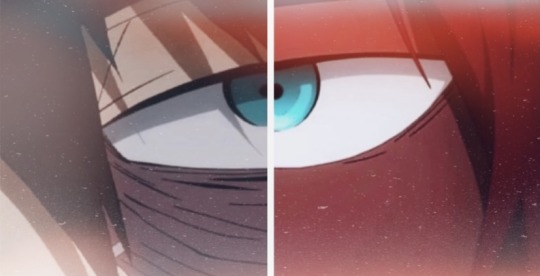
From the start, Endeavor has pitted his own children against each other. Now we’re seeing the complex dynamics of an abusive household, Todoroki Shoto Endeavor’s golden child and Todoroki Toya Endeavor’s scapegoat, play out on a battlefield. At first glance, Shoto looks like the good brother fighting on the side of the heroes, and Toya the bad brother who cares more for plotting villainous revenge than anything else. However, it’s more complicated than that: a look at abusive dynamics and the character foiling between Shoto and Toya underneath the cut.
Before I begin, a brief explanation of the golden child and scapegoat dynamic.
Abuse isn’t just a thing that happens. It’s a power dynamic. The Todoroki Household is considered an abusive household, because all the power is held by one man, Todoroki Enji. An abusive power dynamic can be explained simply as a person who uses the power they have others to their own advantage.
An abusive teacher is someone who steps out of line and acts inappropriately with a student, who they are responsible for because they have power over them. An abusive parent will use their authority as a parent to act in a way that’s not in a child’s best interests.
Abuse is also a cycle. It perpetuates itself. The reason abuse is cyclical is that, in an abusive dnyamic, fights or disturbances can’t resolve in a healthy way so usually things will go back to status quo and power will be held by the abuser again at the end of the disruption.
I’m simplifying here to try to make this as understandable as possible, but abuse is a power dynamic. It comes down to a question of: Who holds power in the household?
In the Todoroki Household, it’s Todoroki Enji who holds all the power.

In a narcicisst’s household, everyone exists to serve the narcissit. This is quite literal in the Todoroki Household. Enji only had children so they could take on his dream of being number one hero and he could live vicariously though them.
Let’s strip away all the fantasy paint in this scenario and define it in more realistic terms. Enji thinks he is entitled to something: the title of number one hero. Enji is unable to handle the feelings of being denied the thing he wants, so instead he sets up a family.
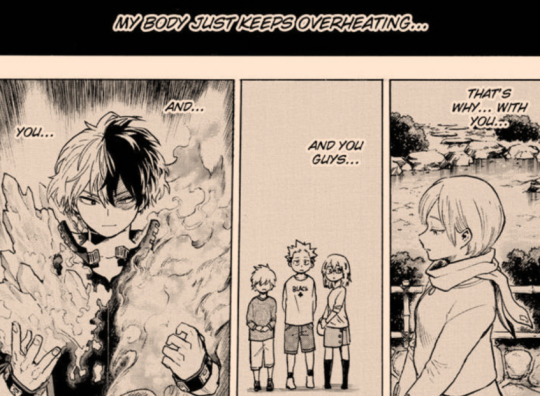
Enji’s family exists for his emotional benefit. He expects his family to “give him something.” He only had a family in the first place, because he thought he was denied what he was owed. Enji had a family for selfish reasons, and thought they existed to fulfill his ambitions, his intention from the start was to use them. So, it’s no wonder more traditional forms of abuse (wife beating, child abuse) rose out of these circumstances. The Todoroki Household is built by Enji, and at the center is Enji a narcissist.
(I do more nuanced takes on Enji’s character in other meta, but this isn’t the time or the place to talk about it here).
The household is centered around Enji, he’s the most powerful person in the house, and he expects the household to give him what he wants. When he’s denied what he wants, he’ll rely on abusive tactics to get it.
There are many types of abuse. Tactics used by abusers include: private criticism leading to doubt and hurt; public criticism leading to shame or humiliation; threats of emotional or physical withdrawal leading to abandonment; withdrawal of money or sexual contact that leads to a devaluation of financial power or decrease in sexual self-esteem; verbal threats that can begin a process of fear; verbal and physical tirades or tantrums (i.e., power displays) that can leave the victim feeling helpless; and finally, physical aggression that can lead to fears of physical death.
In the process of a relationship where a man uses these "tactics" on a woman, any or all can be used in any order, at any time. Usually in the beginning of the relationship, criticism and withdrawal are the two most used tactics that lead the man to have an increased sense of power and control, and the woman to have a decreased sense of power and control. [Source]

Endeavor is denied what he wants. Endeavor gets impatient.He denies that Shoto is even properly in pain, and claims he is just faking it. Endeavor uses physical aggression as an intimidation to get Rei back in line. We also know this happened, Rei fought Endeavor hard for Shoto’s sake at first, but over time became more fragile and more mentally unstable.
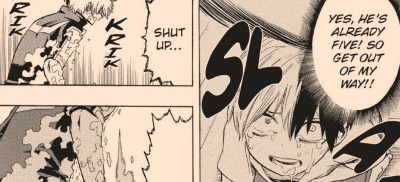
My point is not to detail Endeavor’s abuse because we already know it happened, but to show the underlying motive behind the abuse, abuse is a pwoer dynamic, Endeavor was acting to maintain total authority and control in the household. For the narcicisst everything in the household exists to fulfill the narcicisst’s needs.
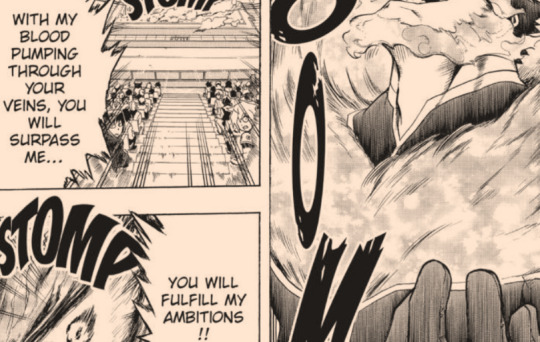
The children as Enji sees them all exist to fulfill his ambitions, so he can live vicariously through them, therefore he doesn’t see their pain. He doesn’t see outside his own ego, because tending to Enji’s needs comes first. He scapegoats one child, ignores the other two, and then the child he does pour his love into he cannot see how much his love and attention is actively harming this child. When Shoto doesn’t want to accept Enji’s attention, he sees Shoto as ungrateful and rebellious. How dare you Shoto, I’m putting all this time and effort into raising you, I’m giving you all of these advantages in life and you don’t repay me????
My point in going into this much detail is that no matter what happens, or how the victims turn on each other in the household, the architect of the abuse, the one who created this situation is Enji. If the victims blame each other, then it benefits Enji because his position at the center will remain unchallenged.
Which is why...
“It’s not better or worse to be the golden child. Both face the psychological whiplash of being raised by a narcissist. The GC becomes the conformer to the extreme, with the intense pressure to measure up, and when they don’t they receive cruelty. The SG becomes the rebel who receives almost constant cruelty and shaming.
The scapegoat and golden child are created because the abuser has a set of impossible to fulfill and aribtrary standards. One of thsee children meets those standards and one of those children does not.
Why divide people up like this, though?
As I said, it’s a power dyanmic. We have already seen this play out in canon once before in the richly detailed telling of the Shimura Household. A household where abuse is taking place will be an unstable environment, because it exists at the whim of an abuser. If there are more than just abuser and victim in the house, people will inevitably notice the fractured mood. This is exactly what happened in the Shimura household, there was a problem that everyone saw but nobody talked about.

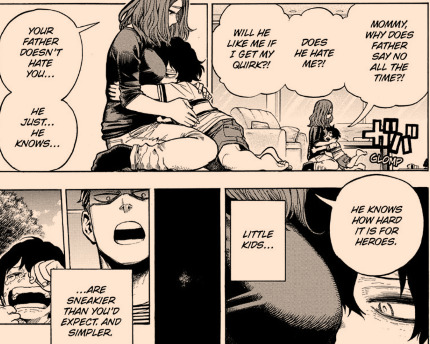
The Shimura household was constantly being disrupted by Kotaro’s abuse on Tenko, however, an abusive dynamic maintains itself by denying the abuse. Rather than confront Kotaro who holds all the power in the household, the weaker Tenko is blamed. This is Tenko’s issue that clings with him all the way until adulthood, instead of just calling his father out for his improper behavior, his family all sided with his father and told Tenko to stop picking fights.
The process will continue as long as the man denies the impact of these tactics on the woman and the woman also denies being victimized. He will deny the impact because of acculturation and insensitivity; [Source.]
Instead of challenging the abuser, the victim is told that it is his fault, he needs to stop provoking the abuser, he needs to stop crying, he needs to stop being so sensitive, the feelings of the abuser are catered to over that of their victim and the dynamic is miantained. By finding a scapegoat to blame for the unrest in the household that is happening because of the abuse, nobody ever challenges the abuse directly.
In other words divide and conquer. If the abuser pits victims against each other, it’s practically guaranteed that nobody will challenge him or confront him on his behavior and he’ll continue uninterrupted. So, in the Todoroki Household where there is a golden child and a scapegoat it continues like this:
So in the family, the Scapegoat and the Golden Child become these roles assigned by the narcissist in order to play the game of Extract Narcissistic Supply through Triangulation.
Triangulation is like driving a wedge between people. Basically, the game involves two or more people who get pitted against each other and usually they don’t even realize what’s happening. They’re just aware of the conflict between each other and there’s always this conflict. [...] The narcissist wants the loyalty of everybody and the narcissist wants everybody fighting amongst themselves. [Source.]
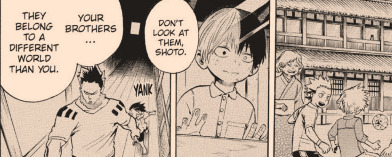
This is why every Dabi fan in the series is saying that Shoto, and Toya were set up to fight against each other, because they were. Enji keeps Shoto separated from his siblings, to maintain control. The scapegoat will blame Shoto for his circumstances believing if they hadn’t been born their fathers attention would be theirs, and the golden child will blame the scapegoat for their rebellion, and their own actions done in reaction to the father’s abuse. HOWEVER. In fighting each other. blaming each other, it is Enji who will escape ultimate blame.
Which is why ultimately scapegoat and golden child don’t really matter, they are both victims of the same abuser. Shoto and Toya are the same in the way they were abused and their reactions to abuse, it’s only circumstances that differ with them.
1. Shoto and Dabi Is the Same
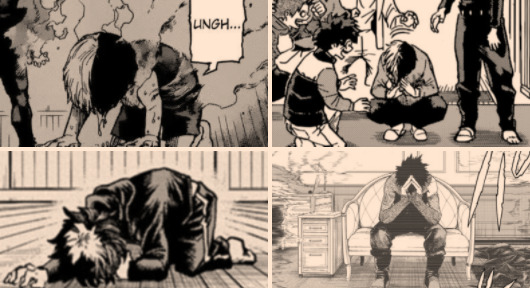
Edit by @miriio
Shoto and Toya are the same, not just because they’re both brothers with the same fire quirk, but because they’ve both been moulded by Enji their entire lives, and their personalities, values, are all in reaction to that. Abuse scars everyone it touches. Arguing about whose scars are worse are besides the point, rather Shoto and Toya mirror each other because they both cope with the stress of abuse in similiar ways, despite their entirely different positions in the household.

In chapter 204 when faced with a foe who won’t give up, Shoto Todoroki flashes back to his father, and begsin to use his fire qiurk.

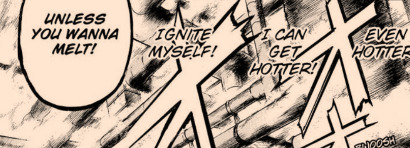
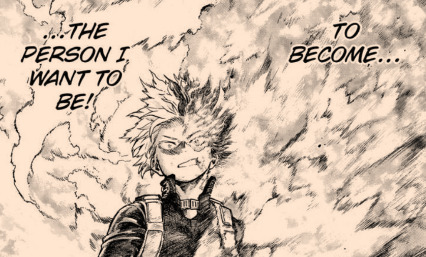
We are shown earlier in this chapter Enji’s attempts to once again assert control over him. Enji texts Shoto multiple times having gone behind his back to get his number. Enji insists that he be the one to teach Shoto prominence burn. (Enji also uses the tactic of understating the past abuse saying he was “misguided” in the past). Shoto while fighting against Tetsu^4 is also fighting against the memory of his father, and uses his flames to his absolute limit in order to prove that they are his flames. He even goes so far to warn Tetsu that he’s not holding back and could cause severe burn damage to his body.
This also mirrors an earlier behavior when Enji pushed Todoroki before his fight with Sero, he overdid his ice quirk to the point of freezing the entire stadium. There’s an idea with Shoto that just because he is starting on the path to healing, and learning to cope healthily, that he never lashes out, or responds to his his father’s violence with violence. That is simply not true.
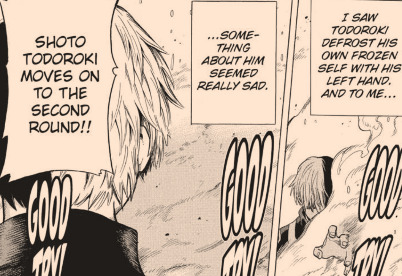
Shoto’s character arc is not complete. He is still dealing with this. As far back as the fight against Class B, he was getting what look to be trauma flashbacks in the middle of the fight, and could have even possibly been triggered by Tetsu’s relentless beating down on him.
Shoto and Toya maintain a similiar pattern of behavior, in that they intentionally are docile, and hold back their strength in a fight. Shoto used to never use his flames at all. He also usually uses them far less effectively than his ice quirk.
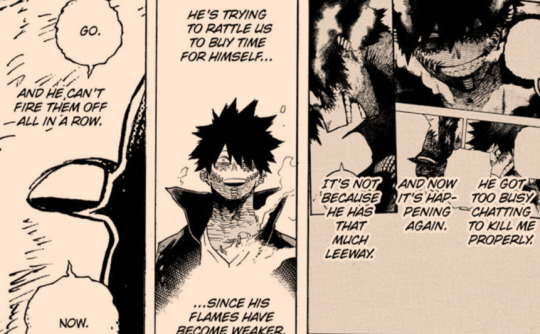
Toya also, uses his flames sparingly in a fight (albeit for different reasons, his flames will burn him as he has no way of cooling himself like Shoto). However, when pushed in the situation, especially emotionally he will go all out. He’ll use the fire with far less regard for who he burns or even for burning himself.

Toya doesn’t use his flames at all, until he does and then he has no sense of moderation.
Besides the way they use their flames, and their bad relationship with their own flames, (Shoto holds them back, Toya is burned by them.) They also both tend to overuse their quirk when they get emotionally riled or are lashing out. Their fire is a metaphor for their emotions, but more on that later.
Shoto and Toya exhibit several behaviors, the similarities are especially strong between Shoto and Earlyroki. First and foremost, they both insist on doing everything alone.


They’re both (Dabi, Earlyroki) highly individualist people who purposefully distance themselves from others, and deny any closeness to others because they need to feel strong on their own.
Shoto and Toya are people who have lived their entire lives fighting their controlling father over agency over their own lives in different ways. Toya fights Endeavor’s rejection of him, and Shoto fights Endeavor’s smothering and insistence that he take his legacy. The reason they cut out everybody else from their lives is because (1: their father dominating and controlling them they never learned to make connections with others, 2: they live their entire lives focusing on battling against their father).
However, the methods they use to fight their father are what their father taught them, because ultimately it’s all they know. Children who are raised in an abusive household grow up improperly. They don’t know healthy means of dealing with their emotions because they are never taught these. Developmentally, they are stunted and this can even have effects late into an adulthood so it doesn’t actually matter that Dabi is in his twenties (especially since he died in his teens).
Shoto, and Dabi are to an extent what their father made them to be. They are staunch individualists, who rely on the strength of their quirk to get what they want, like being the strongest truly is the only thing that matters. This behavior is shown in the both of them, but especially with Earlyroki. There are parallels. The way they both deal with small fry villains.


The scene where they both take out minor villains by entirely dominating them with their quirk is a parallel set up between the two of them.
They also both have a tendency towards dissociation to try to deal with past trauma: IE, trying to move themselves away from their feelings and insist their not feeling anything in order to avoid their feelings.
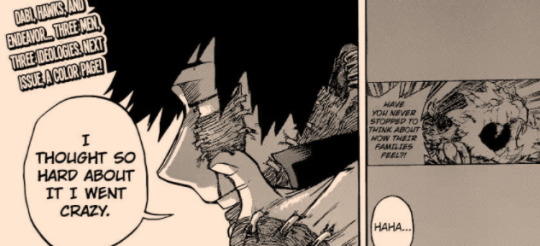

At their worst, Shoto and Toya show off several of the same behaviors. These are all symptoms of abuse. Their shared inability to regulate their own fire is a metaphor for the fact that neither of them were taught how to properly regulate their own emotions.
A healthy adult is able to handle stress, and negative emotions in healthy ways. They can put a lid on it, deal with it at a better time, think and sort through them. Shoto’s emotions always, always, always, come out during a fight even if he insists he’s letting go of the past and his father. Dabi and Shoto show behavior where they are either completely emotionally remote and unreachable “off”, or they are flipped “on” and completely unleash themselves. The point of these states of being is that Toya and Shoto are themselves unstable, because they were not fully developed emotionally, because they did not grow up in a household where their emotional well being was put first and foremost.
They grew up in a household where they catered to Enji’s emotions first and foremost, and because of that both Shoto and Toya have trouble finding themselves in their fire. They also show several other symptoms, dissociation, social isolation, and a belief that they have to be strong and handle everything by themselves. Dabi cannot accept cooperation, and neither could Earlyroki. IN effect, Dabi is still fighting against the idea that he is weak that was beaten into him by his father, so of course relying on others is the sign of that same weakness. They both let their flames burn because they feel the need to be strong.
2. Shoto and Dabi is different
I am making the argument that they are emotionally very similiar, and they both are who they are in reaction to what Endeavor did to them. They just take a different tack in the way they frame themselves. Dabi the villain, Shoto the hero.

Shoto mentions very early on his quirk could be used to kill people, but he won’t, because that’s not a heoric action to do.

Dabi says that he’s killing these villains for a purpose. We learn later what that purpose is, to get his body count up to thirty in order to further stain Endeavor’s name.
In other words, Shoto fights against his father as a hero, Toya fights against his father as a villain. This also reflects the golden child / scape goat dynamic. Shoto on the whole conforms, Dabi on the whole rebels. Shoto is still in the middle of hero society.

Shoto’s strategy has always been that he has to work around Endeavor to get what he wants, which leads to Shoto cooperating with Endeavor on many occasions. He interns with him because he’s the number two hero. He often has his boundaries violated by Endeavor wanting to act like father son in public and Shoto not being comfortable with that.

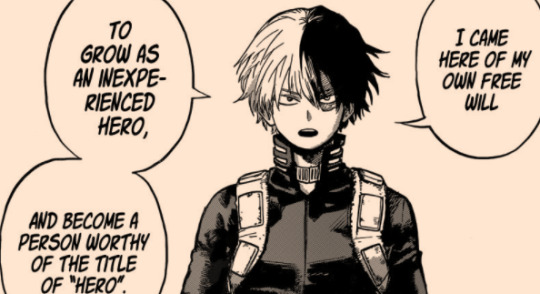
Shoto’s strategy is to exist within the same framework that his father created, but learn to be his own hero. In this strategy he gives Endeavor what he wants almost as a trade for what Shoto still needs, which is practice and training to become a hero on his own terms.
The golden child conforms, the scapegoat rebels. Shoto tries to accomplish what he wants inside of hero society, whereas Dabi pushes his agenda as a villain. Shoto lives to become a true hero, and wants to become a hero for his own reasons not because his father pushed him to, but because All Might inspired him.
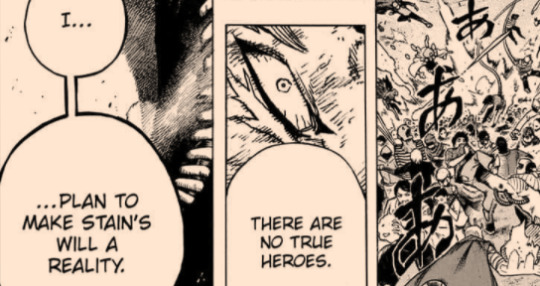
Toya not only declares that there are no true heroes, but he dedicates everything to tearing down what he sees are false heroes. His strategy is one of rebellion. Toya is aware of the arbitrary and hypocritical labels of hero and villain in this society, and because of that goes out of his way to show someone how villainous the actions of a hero can be.
However.
Shoto wanting to become a hero.
Toya becoming a villain from necessity.
Isn’t as black and white as it seems. Toya has what Shoto lacks, which is awareness, the ability to criticize society and the situation he was in. Enji isn’t the only one to blame for the abuse of the Todoroki household, the society that allowed it to happen is also to blame. Shoto is capable of unknowingly inflicting violence on people who are just like him victims of abuse because he lacks Toya’s outside perspective.

Shoto, that kills people.

Shoto, that also kills people.
The point being it easily could have been Dabi that Shoto stabbed to death with an icicle, or burned alive to the point where half of his body was smoking. It could have been Dabi who has the same scars as him, who was burned by the same man. It’s only chance that he was going all out against Shigaraki instead of Dabi. Shoto can’t see villains as victims of the hero system, even though he was a victim of the same system.

Shoto hesitates when he learns that it’s Toya but what is the difference here? He was ready to use lethal force on Shigaraki a moment ago. Has anything truly changed? Dabi is still an enemy trying to destroy hero society. He still kills innocent people. He’s just now a villain that Shoto happens to know personally.
My point is that Shoto’s conformity can set him up against victims of the same society. The same way that, Dabi’s rebellion can lead him to harm his own family.

Dabi’s rebellion is just lashing out. The scapegoat because they are the lowest position in the whole family, because they are isolated, can sometimes associate the abuser’s actions with the whole family. We saw this with little Tenko. Tenko resented both his abuse father, but also his little sister for tattling on him, his mother and grandparents for not comforting him and taking any steps to stop his father. When you are the lowest rung on the ladder, when the stress of the whole household is taken out on you, you tend to see every member of the family as the same.
Dabi absorbs the stress of the whole household. When he inevitably retaliates because nobody can keep that stress inside of them, and Dabi has been taught no healthy means of dealing with that stress, he is pitted against both other members of his family and Endeavor himself.

Dabi’s rebellion will hurt other people in the household, he has no regard for Shoto whatsoever, he sent Ending to Endeavor who ended up kidnapping Natsuo, he also is probably going to cause Rei’s setback.
However, at the same time Dabi’s lashing out is inevitable. Dabi was made to bear the stress of the entire household when he was blame and ousted as the scapegoat instead of his father Endeavor. Dabi is dealing with those emotions alone, lashing out on them alone, he only sees his own pain, but that is because to begin with, and all this time he has been suffering alone.

That’s where we get to the main difference between them, Shoto now has support, and Toya doesn’t.
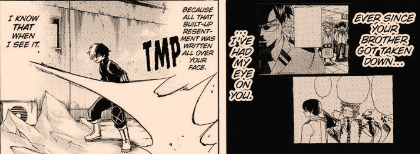
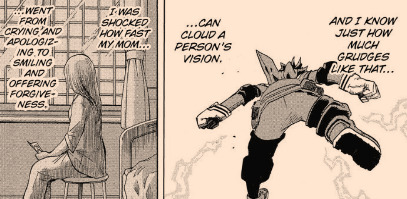
Shoto even says back as early as the stain arc, which is the arc that Dabi first emerged in the aftermath of, that the problem with Earlyroki is not that he was angry, but that he was dealing with that anger all alone. He says it, that being all alone warps your vision, to the point where you can only see yourself.
Dabi is cut off from others, he might care about them but he severs those feelings away from himself. He has been isolated at least since he died, and maybe all his life, and even the connections of the league can’t bridge the gap between himself and others. Dabi is someone stuck in permanent Earlyroki phase because to him he lives his life for one purpose.
Shoto has been allowed to develop as his own person, because he let others in. The biggest difference between them can be illustrated with their fire. Dabi says his flames are Endeavors flames. Shoto is told that his flames are his own.
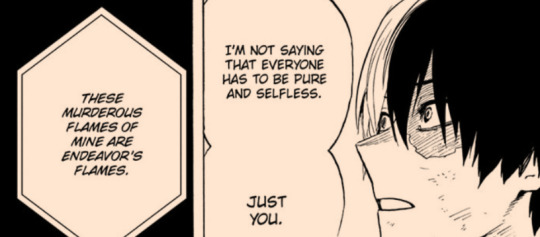
However, Shoto did not reach this consclusion on his own. He was told this by someone else. Shoto could not even take the first step until someone showed him the way, so who is to say the same can’t be true for Dabi?

Dabi has been separated from his family, homeless for ten years, and he literally died that one time. It’s likely that in all that time nobody has told him something so simple as “Your flames can be your own.” Dabi doesn’t know he can have a life outside of revenge against Endeavor because he hasn’t been shown it, he’s only ever known his father’s abuse and his fight against it. We don’t know if the league can reach him or not because he hasn’t been entirely honest with the league until right this second.

There’s a reason that the camera is cut like this.


Shoto’s scar, the damage inflicted on him, and Enji’s unscarred side. It makes a point. Is Dabi really the enemy in this situation? Is Dabi the ultimate villain? He plays the mastermind but he’s not.
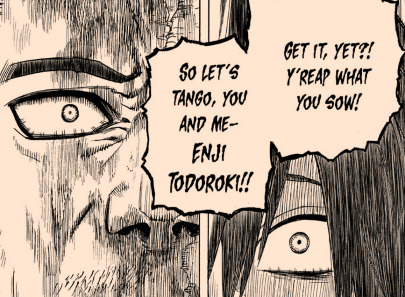
Both Dabi and Shoto were burned by Endavor’s flames. It was Endeavor who created the situation and pitted them against each other in the first place. Which is why hero or villain, golden child or scapegoat it honestly, should not matter. Dabi and Shoto are not each other’s enemies, they were just made to think that way by Endeavor’s actions all the way back from when they were kids.
If Dabi is blamed for his own rebellion. If he’s villified for it. If Dabi is made out to be the bad one for reacting the way he did, then, it’s no longer Enji’s fault for abusing him in the first place. After all, Natsuo, Fuyumi, and Shoto were similiarly abused and they didn’t react that way. Maybe Dabi just had bad vibes. If Dabi and Shoto are fighting each other, neither of them are fighting Enji, and the society he represents which enabled Enji’s abuse. While victims blame each other for their own reactions they don’t confront the abuser.
Endeavor burned them, and Shoto, and Dabi are coping with those lifelong burns in different ways. Instead of trying to kill each other, they have much more to gain from sympathizing with one another. Shoto’s path to become a hero and surpassing his father, should take the course of being a hero who rescues. We’re even shown in this arc how horribly violent Enji is towards Shigaraki, a victim of similiar abuse to Shoto. Shoto would become a better hero, from listening to Dabi’s perspective and learning about the flaws in hero society. Whereas, Dabi needs to learn that he has a future beyond dragging his father to hell with him. Shoto was only able to open up to other people because someone forced their way through his walls and told him that his flame was his own, and Shoto can be the one to open Dabi’s eyes that his flame can be used for more than just destruction.
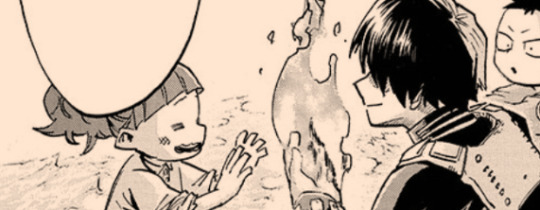
Shoto’s desire for a hero is not wrong, Dabi’s desire to confront Endeavor’s abuse is not wrong. Both of these things are necessary. To make a person stop behaving badly you have to confront them about your behavior. However, it’s not healthy to linger in your pain forever because you won’t be able to move on and heal.
Shoto is someone who can tell the all important words to Dabi. Your flames are your own. Didn’t you want to be a hero?
PS. It’s really hypocritical to say that Dabi is wrong for announcing what Enji did on public television, like... Shoto tells his backstory to literally anyone who asks. Fuyumi casually discusses the fact that Natsuo thinks their father killed their brother with Shoto’s two friends from school. THEY ARE ALL LIKE THAT. THE TODOROKIS WILL TALK ABOUT THEIR DRAMA IN FRONT OF ANYBODY.
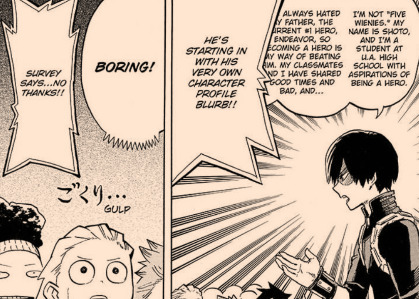
#mha meta#todoroki shoto#todoroki toya#todoroki shouto#todoroki touya#touya todoroki#shouto todoroki#dabi#shoto todoroki#todoroki family#tw: abuse#fuyumi todoroki#natsuo todoroki#rei todoroki#character foils#shoto dabi foils#todoroki dabi foils#todoroki dabi#dabi todoroki#my hero academia meta#my hero academia theory#my hero academia analysis#my hero academia character analysis#bnha 290#mha 290#bnha spoilers#mha spoilers
614 notes
·
View notes
Text
[2ha Character analysis] [Chu WanNing]
I am only human.
Spoiler Warning // TW: Self-esteem issues I am not too sure what to put here but please stop reading if you are uncomfortable. Spoilers for smaller bits throughout the entire novel.
The great immortal cultivator Chu WanNing is perhaps the most misunderstood character in the novel. It took Mo Ran, the person closest to him, two lifetimes to really understand his lover. Given that his character is built upon the idea of someone being held on a pedal stall and is forced to live for the greater goods. Perhaps, us the readers do not understand him that well.
1. Chu WanNing is dehumanized by all around him.
There are two ways to dehumanize a person - either to tread on them like an animal or to idolize them as a god. Everyone in the novel, even Mo Ran, looked at our YuHeng as a god-like being completely detached from the worldly desires. Chu WanNing was less of a person and more of an idol imprisoned by the unrealistic standards set by others. He was carved out to be ascetic, righteous, and pure. When he wasn't viewed as an otherworldly celestial being, then he was an object of desire by Hua Binan who claimed to love him but never considered him as a person who had his own wishes. Taxian-jun had complicated feelings for Chu WanNing but in the end, still viewed him as a property that belonged to him and his carnal desires. If the heavens had eyes, perhaps the rains were tears shed for Chu WanNing.
Chu WanNing also dehumanized himself but poorly. Going against his true loving nature, he had to keep convincing himself that he did not need other people and that the warmth that he once desired had indeed gone too far out of reach. Love might have graced all beings but still wanted nothing to do with him. He lied to himself that it was okay if no one noticed him or, if no one offered him some comfort. His self-esteem was reduced to crumbles and what he saw in the mirror became distorted. If people around him had not been able to completely extinguish the flame inside then Chu WanNing did it himself. He successfully convinced himself that he was ugly, unlikable, and intolerable. Otherwise, he would dare hope.
Hope. Before meeting Mo Ran, perhaps Chu WanNing had lost all hope for love or maybe, any form of meaningful intimate relationship with another person. The young Mo Ran held his hands and ignited that flame again. Mo Ran was a way out for him from the seemingly eternal darkness - maybe he could still turn around, open his heart, and that maybe he could also...
But then all got shattered as he watched Mo Ran also slowly pulling away. Not just pulling away, Mo Ran was also increasingly cruel and cold to him. Not knowing about the curse, Chu WanNing had no one else but himself to blame. He curled into himself to reserve that little flame that Mo Ran lit up, clinging onto it, not wanting to let go. Despite his pride, Chu WanNing held onto the handkerchief, held onto the pear-blossom wine the same way he held onto this love like a life-saving wood plank and he was drowning.
2. His selfish wish
But in the end of day, he was still human. Chu WanNing was also tied up by his worldly desires, especially his love for Mo Ran. He was supposed to act like a fatherly figure and guide the young man to become a good person but he failed in two ways. He was blinded by his emotions and could not act more rationally. His feelings for Mo Ran were forbidden and if known, it could ruin his, Mo Ran’s, and Sisheng Peak’s reputation but still, he quietly hoped that one day, Mo Ran would turn around and look at him again. Then he could not stop Mo Ran from being consumed by hatred and rage. His defeat to Mo Ran in their previous timeline also served a symbolic meaning - the great Yuheng had a weakness and it was love.
Mo Ran hated him, resented him because he thought Chu Wanning did not care and that Chu WanNing never loved him. But the dumb husky never realized that Chu WanNing had always chosen him. He chose Mo Ran over disciplines, conducts, morality, and even life itself.
In his past timeline, I believe he was not being honest (to himself) when he said he would not be able to kill Taxian-jun even if they were sleeping in the same bed. Even without his power, Chu WanNing was still a very talented person. He could learn the Time and Space technique in a short time (something that the great emperor Taxian-jun struggled with), cultivate a magical incense burner with the power to uproot an ancient demonic curse, and destroy Taxian-jun’s Zhenlong Chess formation. Taxian-jun allowed Chu Wanning to visit the armory so getting a weapon was not an issue.
However, perhaps both of them knew Chu WanNing could not kill his emperor. Taxian-jun might have had his grips on Chu WanNing’s throat but the leash that kept him from letting go in those eight years was love.
Note: I wrote what is essentially an essay (with citations and all lol) bout Chu WanNing because I was feeling like he is a much more complex and even morally grey character than what is show on the surface. This blog contains just parts of this "essay" because I thought my previous blog was way too long and I don't have too much new information - maybe just a new perspective, to contribute. haha.
#ranwan#2ha#chu wanning#the husky and his white cat shizun#mo weiyu#mo ran#chu fei#erha#erha he ta de bai mao shizun#shizun please love yourself
115 notes
·
View notes
Text
Depression, Trauma, (and Most Importantly,) My Thoughts on Hello Charlotte EP1 & 2
Eating has been difficult for me for as long as I remember. It started off as an aversion to food, in favour of spending my time more efficiently on what my dumb little mind viewed as more important: Homework, video games.
Over time, it turned into anorexia. I had already gotten used to eating just under 500 calories a day, and my depression took my poor habits and twisted them into a cowardly and slow attempt at suicide.
On my road to recovery, I’ve found that years of poor eating choices have lead to my body struggling to process food. I have to eat at a painstakingly slow pace lest my stomach turns against me, and the smell of food is sometimes enough to diminish my appetite altogether. My bowel movements are, for lack of a better word, a shitshow.
This brings me to today, the 10th of August, 2021. 6 or so years of barely eating enough to survive later, I’m setting the world record for the slowest consumption of a fillet o’ fish in the history of mankind.
In my absolute boredom and unfathomable stomach pain, ManlyBadassHero’s playthrough of some random horror game (I can’t remember the name) appears in my YouTube recommended, and I’m reminded of a horror game I bought on sale on Steam, the last of a trilogy. In all honesty, I only bought the game because it was dirt cheap and one of my sisters’ names is Charlotte. I was too horrified at the time to process the story nor play the previous two games, so I did a quick achievement run and left it at that. I was certainly very confused as I had no idea who any of the characters or what any of the concepts were, but the gore had me too mortified to go and find out myself.
A year later, I’m looking the trilogy up on ManlyBadassHero’s YouTube channel, and decide to start from the beginning of his Hello Charlotte journey, in 2016.
Hello Charlotte EP1
I’m going to be completely honest with you, the first game really didn’t resonate with me too well. It was a cute, quirky, RPG Maker horror game, with two loveable main characters and an interesting world. However, with context from the third game, the events felt too self-isolated and inconsequential. Felix and Charlotte are in a little self-contained TV world created by a fictional race called Pythia - creatures with 3 or 4 eyes that can create miniature dimensions, once brought into a hivemind by an “Oracle,” which seems to be some sort of god. They all seem to be falling apart and have taken a horrific turn as most of the Pythia have been “executed,” and those who haven’t have either gone mad or into hiding in their own bubbles of (albeit temporary) safety.
The ending of the game is somewhat misleading, too. Once Charlotte and Felix escape the TV world by having Charlotte merge with the Oracle itself, the game almost plays off the previous events like they were all a story made up by a young and imaginative Charlotte. Did they happen at all? Is she a reliable narrator or point of view to begin with? (Spoiler alert, she is not.) The explanation for it all seems to be that Charlotte herself is a schizophrenic, though the legitimacy of this is brought into question in the third game, which I will talk about later. Altogether, the game didn’t bring out many strong emotions in me, and I was starting to zone out as I moved on to the second game’s playthrough.
Hello Charlotte EP2
What struck me as odd in the second game is that while the first game seemed to bring Charlotte out of her own strange, black-and-white world and back into reality, we’ve found out that she’s right back where we started last game. A black-and-white world, inhabited by her imaginary friends. Aliens, gods, and the like. However, Charlotte’s seemingly made-up world feels more alive this time. I’m not sure if this is the consequence of the game developer improving their skills or an intentional detail, but even more characters are introduced, and previously shallow tenants of Charlotte’s home are given more depth. The hazmat-suit wearing aliens have faces, personalities and whole backstories attached to them, now. Charlotte has a best friend at school named Anri, who has a obsessive crush on her. She’s friends with a bullying victim named C with horrible germaphobia, who has almost identical struggles to her (more on those struggles later.)
What also surprised me is the continuity between the first and second game. For some reason, I thought that this Charlotte would be starting from scratch, completely oblivious to the fate of the first game’s iteration. However, this concept only seems to be used in the third game, so I guess I was simply mislead. This game, in fact, takes place 3 years after the first, and the Oracle still lives on within Charlotte’s conscious. However, it’s a dying god, on its last leg. It had already been dying during the time of the last few Pythia, but it had used the last of its strength to free Felix and Charlotte from their world. As the Oracle’s health declines, so does Charlotte’s mortal body.
Unlike the first game, most of the themes in this game hit way too close to home. The feeling of second-hand helplessness when someone you barely knew ends their own life. Anri’s obsessive and outright manipulative lesbian crush on Charlotte, bordering on bullying. The schooltime harrassment and trauma Charlotte underwent. The fear and dangers of social interaction. Feeling unlawfully punished by your school teachers for seemingly nothing at all. Depression, self harm, and the primal urge to escape from it. Getting roped into others’ mental health, until both of your issues converge into a disgusting amalgamation of the need but severe lack of therapy and a break from it all. Delusions of what could’ve been and the possible, yet near impossible future ahead. Looking back on everything you’ve ever done and regretting every second of it.
While I ticked off the trauma presented to me on a silver platter in the form of a fucking RPG Maker game like a twisted bucket list, I found myself relating more and more to not only Charlotte, but the students around her. Scarlett, whose life was so perfect that nobody had even thought about her possible mental issues until it was far too late. Anri, who would lay down her life for a girl who simply doesn’t feel the same way. C, who desperately wanted to escape from reality by any means possible.
An interesting fact about Hello Charlotte is that there are numerous omnipotent beings amongst its cast. They aren’t shy about providing very in-depth character analysis to Charlotte, and in turn, to the puppeteer (I suppose now is a good time to inform those who are unfamiliar with the series that the puppeteer refers to a species, character, and the player, all at once. Charlotte has a puppeteer controlling her by the name of Seth. You are/are controlling Seth as the player. Capiche? Capiche.)
What this meant for me watching Manly’s playthrough was the feeling of two gods (in this game, at least) peering right into my soul, analysing characters that reflected my exact experiences and even my personality during my school days. I learned and realised things about myself that I simply hadn’t known before. Just like Charlotte, I’m simply looking for direction in life, and I’m too afraid to act without instructions. I found myself bullied, manipulated and abandoned by someone who simply wanted my affections, and only learned to miss them when they were gone. Like Anri, my desperation for love and approval from an individual in turn lead to anger and resentment for them. Like both Charlotte and C, I eventually turned to hurting myself to make all the pain go away, refusing help from others and developing a shell of false optimism and naivety to forget about the damage I had dealt to my body, personality and relationships.
As much as I hate to admit it on my little obscure Tumblr blog with 0 followers and 0 traction, I still struggle with these things. I have no direction in life, and wander aimlessly, hoping for one of my offshot attempts at content creation to take off. I find myself missing the girl who emotionally abused me to hell and back every day. I resent another girl for never feeling the same way I felt about her. I still don’t take care of myself, and spend every day in a state of denial about my physical decline and sickliness. I’m so incompetent emotionally that I spend days ignoring my own boyfriend, starving him of the proper relationship that he deserves all because of how broken, fragmented and distant my own mind is.
Hello Charlotte EP2 has four endings. All four of them, in my eyes, are bad.
In the first, C and Charlotte overdose together, leaving their mortal realm to become gods. They choose to ignore and forget the pains of their mortal lives, and live the rest of their godly lives in ignorant bliss. Do I want to forget about my depression and trauma? Learn nothing, and forget about everything that made me who I am today? Or worse even, do I dare take the plunge into “godhood,” and leave this mortal plane to end my suffering altogether?
In the second, Charlotte discovers that C isn’t who she thinks he is, and she finds him without a soul. Alive, but empty. Charlotte could not save him. Consumed by grief, she ascends and becomes a god, consuming the entire world around her. After all is said and done, she realizes her mistake. All of her friends are gone, C is still empty and unresponsive, and now she is alone. Sometimes, I feel as though I’ve already gone through this ending, many times over. Countless times I’ve let my depression become all-consuming and take over my life. I’ve pushed so many people away and hurt so many more, and for what? I have nothing to gain from every fit of depression, and the consequences make it seem nothing more but a selfish attempt to make myself feel better.
In the third, Charlotte is the only one who dies. In her last moments, the Oracle comforts her, like a mother cradling her child. They embrace, and say goodbye to each other, as Charlotte’s own life was the only thing keeping the dying god alive. At this point, I’ve started to draw parallels between the Oracle and depression. Depression isn’t always a horrible thing that beats you down and keeps you from being truly happy. Sometimes, wallowing in my own sadness and depression would be the only thing that keeps you sane, stable, and calm. The feeling of hopelessness really is bittersweet, and in desperate times, goes hand-in-hand with acceptance of one’s circumstance. Oftentimes, I find that this is the most realistic way I’ll go out. One day, I may just accept depression, and succomb to it. There may not be a struggle at all. Rather, a quiet, submissive hum, which will fade away into silence.
In the fourth and final ending, Charlotte and C die alongside each other. After her death, Charlotte confronts the Oracle, and wishes to save everyone, and for everyone to be unhappy. Of course, this is where the classic saying: “Be careful what you wish for” comes in. Because of her wish, everyone’s soul, what makes them individual and unique, is erased. After all, no one can suffer if they cannot think at all. In some ways, emptiness is pure bliss. This once again goes back to the bittersweetness of depression. The sheer emptiness it may bring on, at times, is bliss. Feeling nothing isn’t always a bad thing. It’s a way to cope with the horrors of the world. To remember nothing at all is such a tempting yet unattainable solution that I can’t say I haven’t longed for in the near or distant past. Charlotte, of course, is distraught that her friends are all gone, their identities and souls lost forever. Following this, she has one request to make of another god, the observer. She wishes to be killed, as all of her actions have lead to nothing but pain for others and herself. The observer, however, refuses this offer. Instead, he comforts her and takes her hand. They go on a journey together. He suggests that one day, she’ll learn to control her power, and she can recreate the world and her friends. As they leave, Charlotte reflects on her hopes and dreams for the journey. She hopes to learn to be kind, and not hurt others. She wants to change her ways, and become an honest, good person. Charlotte, slowly but surely, is on the road to recovery.
Putting the unsettling sequel to this game aside, maybe I could learn a little bit from Charlotte.
#tw suicide#tw depression#tw anorexia#tw self harm#disordered eating tw#hello charlotte#charlotte wiltshire#anri warhol#scarlett eyler#charles eyler#indie horror#review
22 notes
·
View notes
Text
Fascinating concepts in Golden Kamuy Manga ( part 2)
In part 1, I listed 3 concepts that I find intriguing in Golden Kamuy ( GK), I provided short explanation of these concepts but due to issues of space couldn’t provide more examples. The previous 3 concepts were: (1). Broken men of war & death, (2) Fun dynamics & journey companion does not equal close friendships, & (3) Perspective is where characters are truly at. In total I have 9 concepts but intend to post 3 at a time. So, here we go~
4. What breaks men of war: ( emotional ties)
in my previous post, I’ve mentioned that these men of war are not fazed by death & some are even obsessed with it. goldenkamuyhunting has kindly added that they are affected by the death of those whom they’re emotionally connected to, and provided examples. very true. However, I want to look at this concept from another perspective. As much as the constant brush with death has hardened their hearts & stole chunks of their humanity, all the characters are still human. Their humanity isn’t mostly displayed in how they treat strangers/ enemies, or men on the other side, it is presented on how easily they crumble down once you press the right button: their loved ones. They have strong emotional ties that can break them down, even now after they’ve become so drenched in blood. These ties are mostly connected to ppl who are the reason of their current perspective or their past selves. Sugimoto, the ruthless, breaks down in tears at the memory of toraji, at the idea of failing Yumi, at the thought seeing Asripa become like him: a killer. These emotional ties break him into tears & self loathing frenzy. Sadistic Nikaidou not only mourn his brother, but becomes a shell of a man, delusional, erratic, addicted to drugs & hollow. Tsukishima, Tsurumi’s right hand who kills with no hesitation, becomes all sorts of mess at the thought of Igogusa: anger, tears, loss, despair, explosive rage, self-loath coupled with low self-esteem. Tsurumi himself, the man who fondly remember running thro rain of blood, was so affected by the murder of his wife & daughter to the point of not being able to restrain himself. (many examples) but the point is, I applaud the writer for not going the path of writing these characters as emotionless hard cold blooded war veterans. They have emotions & can break into sobs. You might think they’re unable to form new emotional ties, but some can, sugimoto formed healthy independent ties with shirashi! But the issue is not the new ties. The real issue is these men of war not yet dealing with the old emotional ties from their past. Those ties are eating them from the inside. The pain is still raw!
5. Excellent portrayal of unstable psyche:
Some of these men, due to the past emotional ties, have developed unstable thinking & deep troubling thought process & reasoning coupled with the ugly brutality of war. Other writers will simply write men such as Tsurumi or Ogata as mad guys, crazy & lunatic. But Noda chose a deeper more logical & intriguing approach. Their behavior shows elements of unstable & deeply trouble thinking; little boy Ogata poisoning his mother & Tsurumi’s infatuation of being a soul snatching shinigami. What they have done is unexcused & cannot be corrected. However, they are not mindless lunatics. Both characters are mysterious & rarely allowed to have inner monologue abt their true goal. Both play on different sides & have gone through some personal journey to solidify their nihilistic belief. Both goes even deeper into the depth of seemingly unstable thought process. Ogata, lacking family love, questions the concept of pity, mercy & compassion. Embarks on a journey to prove that he’s not alone in feeling no guilt over human death. That his tragic thinking is not up-normal. Other ppl exist like me. ppl other than weird Usami. Nothing is wrong with me, so father should accept me. So tragic. Yet Ogata even with this unstable thinking is portrayed as smart with analytic thinking, skilled, seemingly not swayed by manipulators & very perceptive! Same goes for Tsurumi, extremely manipulated, cunning, intelligent & sweet talker, but was shown as a loving father as he held his daughter in his hand in most of his Japanese language teaching scenes with wilk in Russia. His family’s death deeply troubled him & changed him into the monster he’s currently is. Obsessed with their bones. Not mourning them yet. His position as the story’s villain adds to this but in a very balanced way. There are more examples, such as Usami & a number of the tattooed convicts. But the point is the writer treats the characters as human, who are capable of unstable obsession & thinking, yet can display normal behavior & excellent logical thinking as well.
( btw: I’m not putting any character with the same scale as the other, or saying they’re equal or identical. They are NOT. I’m simply looking at a ting aspect from their behavior in light of the concept they share)
6. No heroes:
I duno abt you. But I don’t sense that this is a story of a bunch of alliances saving the day against the big baddie. I could be wrong tho. But this story has sth that is lacking from most stories, which is: each side have winning points as much as loosing points. Meaning each side has arguments that can lead to their logical success as much as arguments that sheds some light on the holes in their plans. Even the argument that says minority groups should have their own land with their own culture, while very just in concept, the application is quite complicated. A group of ppl with no strong army sitting on a land of rich resources won’t be left alone by other nations. It never happened in the real world, & while GK is fiction, it is safe to say that Noda is aware of this as he made Tsurimi himself point this out in ch,271. Even if the minority groups get their land, they can’t preserve their own culture if they continue their old ways without adapting into new generations & without reaching out to the outside world. Once again Trsumi pointed this out while talking abt japan itself. I duno how Noda plans to solve this. But This is not even exclusive to the Auni/Japan/Russia situation. Again, the story itself is way bigger than that. Each character is not even the hero of their own story. Asirpa’s trauma of finding herself shouldering the burden of an entire culture while struggling to have a normal selfish goal like any normal girl. Sugimoto becoming her body guard while she solves an issue that he himself isn’t that much interested in! he just wanted her to be happy. More importantly he wants her to NOT be like him. Living thro Asripa while he should be trying to figure out his own path, rather than looking for salvation thro the innocent angelic Asipra or becoming a human skinning tool to get the money for Ume’s eyes treatment when she herself never asked him to! Tsukushima, desperately trying to believe that there’s at least some bigger picture good for following Trsurmi, that all the years of blood stinky hands can mean sth, somehow, in the future, so may examples. But I love the concept of grey characters so dearly, no heroes, no angels.
Disclaimer:
I know my explanation for each argument & each concept & the examples I provide can be misunderstood. But I assure you that each time I provide an example, I’m looking at a tiny aspect of a deeply complex & intriguing character that cannot be summarized into one or two concepts & is bigger than to be compared to other characters as well. Each concept is shared by a number of characters but with different approach, level & reasoning behind it. If I want to discuss a certain character in depth, I’ll do that in a post dedicated for them alone.
Lastly, This is just a fraction of my personal opinion abt the story & characters. I’m not claiming this is how they are truly written or this how Noda intended it or even that you should share my thoughts. I just think this manga is so darn good & rich with fascinating characters!
#Golden kamuy#Saichi Sugimoto#Tokushirō Tsurumi#Tsurumi#Sugimoto#Hyakunosuke Ogata#Ogata#Hajime Tsukishima#tsukishima#nikaido#manga#Fascinated paper
40 notes
·
View notes
Text
LN2 Theory *Yet Again*
A/N: Now that I’ve read over this, I can see this being a personal headcanon of mine. So that’s what this is, but it can be seen as a theory as well.
This is a theory, so again, SPOILERS FOR LITTLE NIGHTMARES II
I’ve seen many people blaming either Six or Mono for the events that happened during Little Nightmares 2. Some saying Six is nothing more than a selfish girl of pure evil when she’s literally nine years old, other saying Mono was prideful and let his pride get in the way of his friendship which I can see but still they’re both a bit shaky. I’ve even seen a theory about the Thin Man and his part in this, which I agree wholeheartedly as the Thin Man plays a heavy part in the betrayal of Six (but that’s for another time).
But I haven’t seen many theories interpreting the Eye’s (Aka the Signal Tower Monster) role in all this, or at least not a heavy theory on it. Which is sad because I think the Eye is the main reason for all of this.
Think about it. The universe of Little Nightmares stars a world where your fears can become reality. Mono’s worst fear was being alone — shown in the comics when his friends and classmates were taken one by one and his instant friendliness towards Six despite living in a world where everything hates him — and his fear became reality as he was betrayed by Six and forced to grow up in a desolate signal tower where his only company is the very creature, The Eye, that trapped him there in the first place.
Six’s worst fear is possibly constantly being chased. I’m not able to find a lot of evidence for this that makes the most coherent sense, but in each of the three games in this series Six has been shown to always be on the run. In Very Little Nightmares she’s chased by The Butler. In Little Nightmares 2 she and Mono are both chased by The Hunter, the Teacher, the Doctor and then the Thin Man. In Little Nightmares 1, seems chased by the Janitor, the Twin Chefs, The Guests and finally the Governess of the Maw. Six is constantly being sought and chased after by things that want to kill her for no apparent reason, so the world corrupts her to become the chaser so she can protect herself from a world that hates her.
Both kids become the main piece of the very world they were trying to escape. And all of that is because of the Eye.
I haven’t seen many theories on it, so I’m going through this process with my own interpretation. I believe the Eye is responsible for the cursed world that is the LN universe. From the constant message of eyes shown through both Little Nightmares 1 and VLN, as well as the eye being inside the TV that Mono travels through to reach the Signal Tower, I believe the Eye needs acknowledgment of its existence to survive. It needs others to know it’s there, otherwise it’ll disappear from existence itself. So, it feeds off the fears of others, as in “you fear me therefore you know I’m there”, and creates some sort of loop within the world (or at least the people who inhabit it) to make sure their fears lead back to it. The viewers are enthralled by the TV, and creatures within the Maw like the Janitor and the Granny are interested in its signal as well.
The Eye uses the Signal Tower to access control and order throughout the world of LN. If it’s presence is acknowledged, and it’s feared, then it’s existence is saved.
However, there are certain people who want to disturb that order. Children like the children within the Pale City grow curious instead of fearful from the messages and signals of the Eye. Children like Mono and Six become brave as time goes on, even in a fearful world like this, their persistence and determination overpowers their fear of the Eye. That can’t happen. The Eye must survive.
So instead of making them fear itself, the Eye makes their personal fears comes true. It is able to alter the world around it (the entire Signal Tower is the Eye itself), so it alters what occurs throughout the story. Six befriends the RCG only to have her die and leave Six with trust issues believing it’s everyone for themself in this world otherwise they’re dead meat. She meets Mono, a boy who is alone and lost and will take any form of companionship. The Signal Tower amplifies Mono’s curiosity, which leads to him releasing the Thin Man despite Six constantly pulling him away. Six is to be captured by the Thin Man and placed in an illusion-filled room with all her favorite items, altered into a monster so she can’t escape.
The Eye uses something that Six loves to focus her attention away from Mono, aka the Musix Box. Six’s attention is entirely fixated on the music of the box, which in turn, is keeping her a horrific monster so she can’t escape. As long as Six loves the music box, she can’t leave. The abused protecting their abuser. The Eye now has the fixated attention of a person, and it’s existence is secured.
Until Mono comes and breaks the music box to free Six. They both run, and the Eye needs another placeholder in order to exist, otherwise the attention of the viewers is just going to fade away as even the viewers die over time. So it amplifies the emotion that Six feels now that her music is broken, leading to Six becoming angry with Mono and betraying him. Now that Mono is stuck, the Eye now has a placeholder and is free to exist. Mono grows up within the Signal Tower and becomes the next Thin Man.
However, the Eye is aware of the Circle of Life, and how people die once reaching a certain age. To prevent this, it creates a loop of Mono’s life, from his childhood to his adulthood. The constant stringer of this loop being Six’s betrayal, which leaves Mono to be the placeholder for the Eye’s survival.
All of the events that happen within the world is because of the Eye and its need to survive.
#headcanon#little nightmares#little nightmares ii#little nightmares 2#ln2#ln#little nightmares spoilers#spoilers for little nightmares#six#mono#thin man#signal tower
31 notes
·
View notes
Text
21 tips for writing humor
This was not written by me. It was written and uploaded to deviantart Jan 13, 2017 by DesdemonaDeBlake.
All credit goes to her. I just copied and pasted it here.
There are many theories as to the nature, science, and reason for humor. It's an element of human behavior that seems objective in the skill that is required to execute it successfully, and yet just as subjective for how unpredictably it can hit every individual audience member. Today, I'm going to talk about the various forms that humor takes, and give you some tips for making your humorous story a success. To start with, lets look at what I will call the “five scales of comedy”. (Please note that the following is not intended as definitive list of the only sources and scales of humor in the world, only the ones that I have been able to identify within my own life, time, limited understanding, and culture. Also note that I will use the word “Humor” instead of the word “Comedy,” simply because I do not want this discussion on genres to be confused for the type of story that is opposite of Tragedy.)
The Five Scales of Comedy
A story or other source of humor can usually be found along the lines of five different scales. These are: High Humor vs Low Humor, Sweet Humor vs Acidic Humor, Distanced Humor vs Close Humor, Predatory Humor vs Reflective Humor, and Clever vs Ridiculous Humor. These scales stand apart from the sub-genres of humor (dark, slapstick, dry, etc...), and have to do with how the humor affects the audience. Note that there is no “best” type of humor; there is only humor that works in different ways and which impacts different sorts of people. So wherever you find your story in the scales, know that there is no need to change it unless you want to. Also, the names of the scales are just that—names. Just because your story falls into the category of “low” humor, doesn't mean that it is any less valuable than “high” humor.
Range 1: High Humor
Within the range of High vs Low humor, what we are discussing is the how large an audience we are trying to reach. High humor involves jokes and comical situations that are only understood by a very select group of people. An example might be a comedy series that focuses its humor on the experience of working in a corporate office (like … The Office), or perhaps political commentary. These are only funny to those people who have shared the experience or the political knowledge of the person generating the humor. Basically, the higher the humor, the more the entire set-up begins to resemble an inside joke. This type of humor is excellent for gaining the interest of select demographics who you may want to address. For example, if you only want to talk to nerds (I say non-insultingly because I am one and am proud of it), you might have lots of references to science fiction and fantasy.
Range 1: Low Humor
On the opposite side of the range, you have Low Humor. Low Humor deals with topics, jokes, and situations that are more universal to the human experience. An easy example of this is a fart joke. Everyone in the world farts, and most people are in touch enough with their inner child to think that it is funny if the joke is skillfully set up. Again, there is nothing wrong with low humor; and in certain situations it is even preferable. The lower your humor, the larger your potential audience can be. Other examples of low humor might be family life, slapstick, and situational comedy based on everyday experience. Shows like Spongebob Squarepants, for example, involve such a low degree of comedy that people of all ages, demographics, and locations across the world are able to find delight in it.
Range 2: Sweet Humor
The next range of humor, Sweet vs Acidic, deals with the intensity of the humor itself. Sweet Humor involves jokes, situations, and characters that require less pain and cynicism to appreciate. For example, a story that involves simple characters bumbling around, making mistakes, overcoming, and becoming better people for it would generally fall into the range of Sweet. We don't laugh at their misfortune (or if we do, its lighthearted and with limited consequences, like slipping on a banana peel), we laugh because their situations are joyfully amusing.
An example of this are the sort of jokes and humor found in Youtube “Lets Plays,” like those of Markiplier and Jacksepticeye. We don't laugh because of anything bad happening to these people (or the characters that they play); we laugh because they are eccentric, silly, and joyful in a way that also makes us feel joyful. This form of humor can be tremendously encouraging and uplifting to the types of readers who enjoy it.
Range 2: Acidic Humor
On the other hand, we have Acidic humor. Much like with food, most people have strong preferences and limits to how acidic (spicy, sour, or bitter) they like their humor. Acidic humor deals with laughing at topics that are increasingly serious or even tragic, such as death, illness, social injustice, etc... A popular example of acidic humor is South Park. Those of us who enjoy acidic humor will find ourselves laughing at topics that would otherwise likely bring us to tears. The power of acidic humor is that it helps its appreciators to cope with the difficult truths of life, and also to acknowledge problems that we are otherwise tempted to ignore because they are too hard to think about.
An example of an issue addressed in South Park is the elderly, their treatment, and our fear that we will face the same. Sure, when we watch an episode we laugh when the younger characters mistreat and abuse the elderly in the community. However, a conscientious viewer will then begin the chew on the issue, once the episode is over. We'll look at our own actions, and begin to wonder if our treatment of the elderly is just as bad. Because of the acidic humor, these difficult truths come to the forefront of our minds, we gain the courage to actually think about them, and we can even bring them up in discussion with others. This discussion can then lead to people changing the world for the better.
Range 3: Distanced Humor
This range has to deal with the necessary emotional distance we need in order to be able to appreciate a certain level of humor. Even with lighthearted humor like slapstick, which has very low acidity, the audience needs to be distanced in order to laugh. For example, if I watch Bugs Bunny wallop Elmer Fudd on the head with a mallet, it's generally pretty damn funny. I know that these characters are both flat cartoons with limited depth to their character, and that as non-beings they don't really feel pain. Therefore, I don't have empathy to Elmer's pain (because it is really non-existent), and I can laugh. However, if the show were to show me Elmer's life, how he's been a vegan but famine has caused him to need to find meat to feed his family, and how he struggles to even shoot at a rabbit because it makes him feel like he's betraying himself; then I'm not going to laugh if Bugs hit him with a hammer. I'm too close, and need emotional distance in order for my empathy to not get in the way of my humor.
Range 3: Close Humor
We do not need distance in order to find something funny. With close humor, the jokes and situations actually rely on how well we know the characters and how much we empathize with them. An example of Close Humor is Scrubs. In the show actually find ourselves within the mind of the protagonist, JD, and seeing the entire world through his eyes. He tells us about his insecurities, his genuine pain, his fears, and we actually really care about him as a character. Yet, we find humor in his minor misfortunes and even in his silly victories. The closeness of our perspective amplifies the events that happen in his life in a way that distanced humor cannot achieve. For example, when he stutters and says something embarrassing in front of someone he idolizes, we find ourselves giggling. If Elmer Fudd were to stutter in front of someone he idolized, we wouldn't laugh nearly so hard because we can't possibly understand the stakes of the moment or why meeting this person is so important to him. We need to be close to a character for Close Humor to work.
Range 4: Predatory Humor
With the range of Predatory Humor vs Reflective humor, we are discussing who will be the “butt” or target of the joke. (Note that a joke does not necessarily need a butt, as we will discuss later.) While often used in a negative way, in order to bully and shame others, predatory humor is not a bad thing in and of itself. Predatory humor can be used to tackle and harm negative constructs and ideas in our society. For example, Fairly Odd Parents used to frequently attack neglectful and abusive parenting. Note that the while Timmy's (the protagonist of the show) Parents were frequently the butt of jokes, they were also not the real target (just like parents in general were not the target). The targets were their selfish and non-reflective actions that had damaging effects on their son. We can use predatory humor to attack ideas, and point out the evils that are so often overlooked in society. The trick is to always keep vigilance of your own mind, actions, and motives to makes sure that you do not become a bully who targets the people themselves. Because even if someone acts in an evil way, bullying them will never cause that to change.
Range 4: Reflective Humor
On the other side of this range we have Reflective Humor, which serves to make fun of itself. Again using South Park as an example, the creators would often make their own beliefs and ideals the target of their ridicule. For example, it's fairly clear that the show speaks in favor of LGBT rights and for their being accepted as equals in society. However, they also go as far as to mock people who are so over-enthusiastic and pro-LGBT (to the point of hypocrisy). Another example is when the show begins to teach a moral lesson, the writers will often make fun of themselves through the character of Kyle for being so preachy. The effect of the show making fun of itself is two-fold. First, those of us whose beliefs South Park mocks feel like the show is being fair. Thus, we continue to listen to and respect the views of the creators, even if we don't always agree. Second, we trust the messages of a story more when it has the integrity to point out its own failings. Note that unlike with other scales, Reflective and Predatory Humor can actually be interwoven so that a joke or story makes fun of itself just as much as its target.
Range 5: Clever Humor
The last range of humor that we'll discuss is that of Clever vs Ridiculous. This range is fairly self-explanatory, but the core of its nature is what sort of punchline is delivered at the end of a humorous situation. Clever humor takes the audience expectation and amplifies or twists it to an unexpected place. You can see this in the work of comedians such as Louis CK and Demetri Martin. Martin, for example, has a humorous bit about doorways that say “Exit Only.” The joke then involves his compulsive desire to tell store workers that they underestimate the potential of those doors by about 50%. The delivery of the punchline is true and logical, but it such a way that it humorously exceeds audience expectation.
Range 5: Ridiculous Humor
Opposite of Clever Humor, we have ridiculous humor. This is when the punchline of a humorous situation is so absurd that we can't help but laugh. And example of this is the Spongebob Squarepants episode where he and Squidward get lost while delivering a pizza. They become lost in the wilderness and spend the episode becoming more and more so. Then, right at the end, Spongebob exclaims that they are saved because he's found a big beautiful boulder, the likes of which the pioneers used to ride for miles. And, to make matters even more ridiculous, the boulder works—driving just like a car. We find humor because the punchline is simply so grandiosely absurd that we can't help but enjoy it. Note that both Clever and Ridiculous humor require a great amount of skill and thought to pull off successfully, it's just a matter of your preference and your target audience.
The Five Sources of Humor
Once we identify what type of humor we are employing by using the scales, the next thing to consider is what makes our stories funny. This is something of a challenge, because we don't generally put much thought into why humor makes us feel the way it does. The humor either hits or misses, and we laugh or we don't. Making matters even more complicated is that there are so many theories as to why and how humor works—with everyone from Aristotle to Freud interjecting an opinion. But if we look at the particular sorts of things that make people laugh, we can improve how we use humor in our stories.
Source 1: Misfortune
Whether a cartoon character is slipping on a banana peel, or a character in a romantic comedy finds themselves in an embarrassing situation, the misfortune of others seems to be the most popular form of humor. This is why slapstick and funny home videos have been so prevalent in modern humor. Plato and Aristotle seemed to believe that this was because such humor made the audience feel superior to the characters being ridiculed (Superiority Theory). This seems especially true when we see unlikable characters (like the villain in a children's cartoon) experience misfortune in a comical way.
Though Superiority Theory has its place, I would assert that there is an alternative way that people enjoy misfortune. Perhaps the experience of slipping on a banana peel or being in an embarrassing situation is funny because of our own memories of experiencing the same thing or something similar. Freud and others theorized that humor was a release of energy (Relief Theory). Maybe our camaraderie with the character, mixed with emotional distance from the scene we are watching, creates a safe space to release our own stored feelings of pain or embarrassment. Thus laughter really does become a healing force.
Source 2: Absurdity
In his essay “The Myth of Sisyphus”, Albert Camus defines and explains the absurd.
“It's absurd” means “It's impossible” but also “It's contradictory.” If I see a man armed with only a sword attack a group of machine guns, I shall consider his act to be absurd. But it is so solely by virtue of the disproportion between his interaction and the reality he will encounter. […] Likewise we shall deem a verdict absurd when we contrast it with the verdict the facts apparently dictated. (29)
Though Camus is not talking about humor (rather the existentialist question), I think that the absurd is a source of humor. Audiences are often entertained by the absurdity of a situation. And by looking at Camus' explanation, we can hypothesize that this form of humor comes from the disproportionate contrast of action and situation. An example of this might be one of the last battle-scenes in Braveheart. In this scene, victory looks unlikely, the dramatic tension is high, and it seems to be the most serious moment imaginable. Then, upon being signaled, the protagonist's soldiers pull up their kilts and reveal their bare asses to the enemy. It's so unexpected and so absurd, that many people cannot help but to keel over laughing.
This scene is completely disproportionate to what we would expect to see in this dramatic a moment. The action does not suit the situation, but in a strange way it also kind of does—with the action juxtaposing itself against the situation. Perhaps, just like with misfortune, absurd humor creates a needed release of energy, connected to our own sense of existentialist absurdism. The absurd could then serve to release our feelings of despair in a positive light. The show, Rick and Morty, seems to be built on this connection between absurd humor blended with existentialism and nihilism. Of course, this is just a theory. What you'll want to focus on when writing absurd humor is the relationship of your characters' actions to the situations that they find themselves in. Are they lost in the desert? Have them climb a boulder and ride it home. The stronger the contrast between action and situation, the higher you'll make the potential for absurdity.
Source 3: Wit
Wit is the essence of Clever Humor; its the pithy intelligence that makes us laugh because of all the thought put into a situation. When we hear a witty joke or are part of a witty situation, we find ourselves moving in a forward humorous momentum, instead of the backwards and diagonal momentum of the absurd. But we don't stop at the expected location. For example my mother called me a few months ago, asking me if I was going to wish my brother a happy birthday. The expected response for this sort of set-up/situation is to answer “Yes” or “No”. But I went forward and beyond “No” by asking why she wanted me to congratulate my brother for being one year closer to death (I have an acidic sense of humor sometimes). This reply was much more thoughtful than what my mother expected, and pointlessly taken beyond the realm of reason. Therefore, she found it funny.
Perhaps there is an element of the absurd in any given amount of witty humor. It's as if we are taking extra steps to be as intelligent and rational as possible—ending with us standing somewhere close to the absurd. Using Camus' illustration of absurdity, the soldier with a sword wouldn't necessarily attack the machine guns, but instead go home, refusing to sacrifice his life to be a metaphor. You can see this sort of humor in Youtube series such as How it Should Have Ended. In this series, animators take a closer look at popular movies and then make efforts to enforce logic in worlds and characters that didn't have them. This includes having Severus Snape use his time-travel gizmo to go back in time and kill Voldemort before he became a problem—an action that is so logical that it erases the need for any of the Harry Potter stories to even happen. So when you create witty humor, look to take things beyond the realm of expectation—aiming for the absurdly reasonable.
Source 4: Anti-humor
Anti-humor is when something is so unfunny that it becomes funny, sort of like puns. As we find delight in the absurd and the unexpected, humor and jokes can begin to feel predictable. We begin to look for the solution in jokes, and we're usually smart enough to begin to be able to predict it. In this case, the expected becomes surprising. An example is the classic: “Why did the chicken cross the road? To get to the other side.” If you haven't heard it before, this anti-humor joke is actually kind of funny. A great example of this are the great collection anti-jokes found online.
You can take anti-jokes to the next level using extremely acidic humor. This is where you take serious, grievous, or tragic topics and use them as the punchline for your joke. For example, a joke about a fatal illness is not funny because the person making the joke finds that topic amusing (otherwise that person needs some counseling). A joke about fatal illness can be funny to some people for the exact opposite reason—because of how dark and unfunny it is. Again, I believe this ties into a release of negative energy while in a safe space, and the processing of difficult emotions. If you plan to use the extreme form of anti-humor, please note that many people have very legitimate reasons for not enjoying it. So be careful, and give your audience some sort of forewarning so that you do not spring something so emotionally charged on them without their consent.
Source 5: Familiarity and Value
When I was taking university writing classes, I had an extremely eccentric professor who had all sorts of mannerisms that were unique to him. In the moments when he was particularly eccentric and acting out of his true nature (which he was quite comfortable with), I would find myself laughing, even if the situation wasn't funny. I think others can relate to this, as we all love to talk about fun people that we used to know, and find ourselves laughing even when what we are remembering isn't particularly funny. We laugh because those people acting happily out of their own nature gave us joy, and so anything they do creates a laughter that feels akin to humor.
This mirth through familiarity can be accomplished in stories as well. In Bob's Burgers, for example, we really don't even begin to understand the humor until we develop an attachment and feelings for each individual character. Sure the situations are mildly amusing, but true laughter and humor doesn't begin until we know the characters, their likes, their dislikes, and who they are deep down inside. Once we know that, we laugh as each character acts out of their nature. When we see Louise (one of the protagonists) act with mischievous intent, we laugh even before we know what she's doing because we are happy that she is about to act out of who she really is. Note that this is a rather difficult sort of humor to pull off because you have to create a relationship between the characters and the audience before the humor will be possible.
General Tips for Humor
Tip 1: Create a patterned and uniform blend of humor for your story.
When you choose what sort of humor you plan to use in your story, the best way of maintaining audience enjoyment is to keep it constant. Just like when we watch a stand-up comedian, we begin to develop a taste and sense of expectation for whatever we are watching or reading. Over time, your audience will begin to really appreciate the flavor of your humor, and that appreciation will make your jokes increasingly funny (so long as they are creative and continue to be intelligently crafted). The pattern will also make all of your jokes seem, feel, and become purposeful. Your audience will enjoy this much more than if you seem like you are desperately trying to milk the humor from anything you can get your hands on (you perv).
I recommend you begin by analyzing the origins of humor in your story's world. Is the world simply absurd, with unseen gods of chaos just dropping coconuts on people's heads for pure amusement? Does the humor come from a specific character? A group of funny people living in a serious world that they must learn to cope with through humor? A funny narrator with a unique perspective on life? Once you figure out the origins, determine where your humor will fit on the scales (it doesn't have to be on any extreme, you can stay in the middle of the scales and still be hilarious); and then figure out the source.
Tip 2: Create a genuine story with genuine characters, in order for humor to gain the most power.
If we value stories in terms of how much people enjoy and remember them, the best humor stories are those with good plots and characters. This may seem counter-intuitive when your intent is to make your audience laugh, but think of it this way. If an audience wants just concentrated jokes, they will read a joke-book. Your audience is choosing to dredge through the murky waters of story in order to find the humor with more difficulty because they want a blend of story and humor.
An example of this is the movie,“Austin Powers.” Many people, myself included, watched these movies before we ever watched the James Bond movies that they were making fun of. And we enjoyed them greatly, and laughed the entire way through. Why? Because the characters and story, ridiculous as they were, were good enough that we actually invested our interest and emotions into them. As an added bonus, the story has become timeless and respected in its own right. Even if we face a future where nobody knows who James Bond is, the Austin Powers movies will be able to stand on their own merit because they are more than just jokes.
Tip 3: Be careful about dating yourself.
Speaking of parody and humor losing its ability to be funny, let's talk about references that date our stories. Humor at the expense of popular culture (movies, politicians, celebrities) is a fun ploy of high-humor. It's especially useful for nighttime comedy shows that will be lost to time anyways, within a couple years. When you are writing a novel, however, you are trying to create something that will last a bit longer than that. Additionally, novels take a lot longer to write than an episode of a late night comedy show. This means that by the time you publish and people begin to discover your book, they may not know who the vapid pop star you're making fun of is. Your humor will be lost to time, and your book quite possibly forgotten. Of course, I'm not telling you that you can't use this sort of humor, just that you should be aware of the risks it holds.
Tip 4: Mark every line that is supposed to be funny, and make sure that it is.
Nothing detracts from a story or from a spirit of jovial humor so much as an obvious joke that falls flat. It's like watching an acrobatics show. If the acrobat falls on their face too many times you'll either be embarrassed for them or you'll empathize and start worrying for their safety. Either way, you won't find the situation amusing. In your own personal copy of the manuscript, mark every joke for analysis of whether it actually succeeds and whether it serves to empower the story. Then, ask your editors, test-readers, and writing partner to circle every point that they genuinely found funny. Be sure to pick test-readers who fall into the niche you are writing for, as well as those who do not. If nobody but you marked a specific joke, then you need to either get feedback for how to make it funnier, or else cut it.
Tip 5: Write within your own expertise and authority.
This does not mean that you can't laugh at things, and poke fun at things that are outside your realm of expertise, so long as you have done your research. But consider the power of an insider making a joke about something that you are a part of vs an outsider doing the same. It would be like the difference between me calling most writers narcissists (as I am one, and know that it is pretty true in most instances) and a politician making a joke and calling writers narcissists. I mean, what right does that asshole have to judge us, even if it is true? The point is that your jokes gain power when you can tell them with the confidence of an insider. Not only that, but your audience who is a part of the group at the butt of the joke, will be much more gracious and feel far less attacked when the joke comes from one of their own.
Tip 6: Humor is personal
Humor is something that is highly individual to specific groups and people. For example, I do not understand, nor am I really able to appreciate most British or Spanish comedies. This is not because they aren't funny; they are just as valid and hilarious as every form of comedy that I do enjoy. The reason is simply that because of either how I was raised, my life experiences or because of who I am by nature, I can't enjoy them any more than I can enjoy olives on my pizza (seriously, I hate them). It doesn't matter how artfully these types of humor are composed, there is simply no effect akin to joy, amusement, or laughter when I come across them. In other words, the problem is me and not them.
All this is to make three points. First, it may be more difficult to find test-readers and worthwhile criticism for humorous work. Even if I'm really good at critiquing stories, I will not be able to give you any helpful feedback if your humor doesn't match with mine. And that isn't your fault any more than it's my fault. It's just a difference in taste. Second, humor is as personal and close to the heart as any other story or craft. When you create a joke, you are channeling whatever emotions and mixes of experiences have led you to the type of humor you have. So recognize the emotional bond between yourself and your humor.
The third piece of advice is for those on the other end of the spectrum, those experiencing the humor of others and perhaps trying to give advice. Please recognize that others' sense of humor is just as valid as yours. Whether their sense of humor is simple, complex, dry, witty, dark, acidic, sweet, or anything in between, it is their sense of humor and not yours. Be careful in how you voice any attempts at criticism, as there are few ways to break your friends' trust and confidence as completely as when you tell them, “That's not funny.” You might as well be telling them that their heart sucks, and they are a sucky person.
Instead, acknowledge the differences in people's humor, value it even if that humor makes you uncomfortable, and voice your criticisms accordingly. Try: “This joke wasn't successful with me, and might be perceived as racist/bullying/insensitive to some readers; so seek other feedback to see if it's just me.” You will voicing just as honest an opinion, without formulating a direct attack against the person who has trusted you with something so delicate to them.
Weekly Recommended Watching: Doraleous and Associates by Hank and Jed. (A free animated fantasy Youtube series that manages to successfully mesh several humor types with an over-arching plot. Examine how even there are plot elements that are serious and even sad, the series maintains its humor through well-balanced distance and wit. And if this form of humor does not amuse you, that is perfectly valid and your own unique sense of humor is still a valuable thing.)
7 notes
·
View notes
Text

Hello, everyone.
To recap: There are new fans, and old fans as well as recently turned fans, who truly believe you have to choose Monsta X or Wonho otherwise you’re not a “real” fan. It has reached a point where toxic idiocy is spewed all over Twitter — not really that surprising, but still very annoying — and it has now reached Tumblr; the one place I felt was pretty neutral.
Initially, I wasn’t going to say anything because I felt like it’d only add to the drama. However, as time passes, I see the fandom heading into a direction that is very...well, doomed. Of course, this is merely my opinion and I don’t really expect anyone to hold it to a high regard because I am not God, nor do I believe I am a God-like figure. However, I do think I can still state my opinion upon the matter and try to shed some knowledge that may be utilized positively.
Before I begin, I’m going to try and insert a ‘Read More,’ but should I not be able to make it to a laptop in time before my patience completely disappears, I will tw it as a “long post.” If you dislike long posts and don’t have them filtered, though, and this pops up on your dash and annoys you — I apologize, kinda.
Anyways, let’s go.
—
I don’t really know what happened. Or well, I do, unfortunately.
In the beginning, Monbebes stuck together. We all came together and showed our support as a united body of like-minded individuals who shared their love and support for Monsta X — whether they were seven or individual.
Things went well. Petitions were signed. Billboards were funded. Zoo’s were created.
But at some point, Monbebes began idolizing other Monbebes — and I don’t mean looking up to sensible fans, but ones who are problematic.
Allow to me to repeat this to avoid misunderstandings: It’s okay to look up to fans who are NOT problematic. It really is — be friends with them, aspire to be more like them, I don’t care; do you so long as it’s positive.
But....but....to choose problematic fans to look up to? To choose ones who are known to fetishize a culture? To choose ones who are known, and praised, to fetishize sexualities? To choose ones who provide false hope in exchange for clout while simultaneously invading REAL people’s lives?
Yeah, that’s where everything went wrong.
The wrong people built platforms and their voices were, inevitably, elevated. Everyone began dividing and forming cliques in the name of “unity.” Everyone began losing sight of the big picture — the big picture being a positive resolution.
People stated they wanted a positive outcome, but only if it was on their terms.
Greed. Greed. Greed.
Selfishness replaced selflessness.
Various Monbebes began inserting themselves into the narrative as if it was their own personal emotions that mattered more than Monsta X’s — and that’s not to devalue anyone’s feelings, but I mean...it’s the boys who were directly affected by what happened.
Wonho was the one who had to receive backlash for past events that don’t equate his worth.
Shownu’s voice was silenced despite being a victim to sexually implicit lies and harassment.
Minhyuk sacrificed his own emotions and began keeping hardships to himself.
Kihyun was forced into voicing over his friend’s song lyrics, and is also continually made fun of despite him speaking out and asking fans to not refer to him as “small” and “tiny.”
Hyungwon received, and continues to bear, backlash because certain fans think he’s a liar and also like to criticize him for being “lazy” as if the dude doesn’t work his ass off every day.
Jooheon’s mental health issues were pushed under the rug by many people within the fandom and as soon as he returned, various fans demanded he work more — try harder, be louder and more energetic.
Changkyun’s emotions were disregarded — many fans stating he has an “attitude problem” and seems cold despite the dude literally trying to make everyone around him happy and also sticking up for Monbebes.
Monsta X, regardless of the number, were all continuously pushed past their limits; treated as machines and play-things rather than human beings.
And this is only what has been shown to us. Think about everything that’s transpired that we haven’t seen.
—
I understand that those months were hard, I really do. I was right there with everyone not getting any sleep and trying to balance school, work, projects, etc. I understand it was very emotionally upsetting and I am not devaluing anyone’s feelings because I know it was hard.
But a line has to be drawn.
There has to be a realization that it is Monsta X who has endured the worst of the entire situation. It is not fair to say that the fans had it worse when MX’s actual jobs, lives, health, and futures were all tampered with, endangered, and victimized.
And to top it off — as positive of a resolution that could be made in the situation has been met and people continue to complain.
I understand it may not be ideal — everyone wanted them to come together as seven again and I know how disheartening it is that that isn’t an option right now, but...they’re still here.
Wonho get’s to continue with his career. He can still interact and talk to us. He can do what he wants — I mean, the dude literally has a whole Instagram account to himself when it took a year or two, maybe more, just for SSE to give MX personal cell phones.
The six active members get to continue as well. They released an album that is more than likely going to be nominated for a golden disc award and they’re all, seemingly, recovering. They’ve been able to vacation and from the looks of it, the company is going a little easier on them with their schedules — in a way.
In other words: All seven of them are content.
And for the fandom, we still get to see them. We get to listen to their voices and see their faces. We get to interact with them and watch new shows, etc.
They’re still here — and honestly? It’s a miracle.
Do you know how hard it is for a people to continue considering what transpired? How unusual it is for an artist to be able to overcome legal battles that usually deem unfavorable in the position he was in?
I’ve been in the Kpop fandom for nearly 12 or 13 years now and this is the first time I’ve ever seen legal cases turn out okay for an idol.
History was made and a positive resolution was met, but yet — hardly anyone wants to celebrate.
Instead, a big chunk of the fandom now wants to dive into more drama — separate Monbebes and Wenees from each other and build more cliques.
Say stupid shit like “you’re not a real fan if you only support Monsta X” and “you’re not a real fan if you only support Wonho.”
“Wenees are superior.”
“Monbebes are superior.”
“Wenees love Wonho!”
“Monbebes love Monsta X, and Monsta X only!”
“Let’s listen to boycottbebes!”
“Let’s listen to problematic tarotbebes!”
“Let’s listen to akgaes!”
Just...shut up. Shut up. Shut up. Shut. Up.
—
I hate to break it to everyone who believes the quotes above, but we are all the same.
Monbebes are Wenees, and Wenees are Monbebes.
There is no competition.
There is no Monsta X without Hoseok, and there is no Hoseok without Monsta X.
—
You cannot hate the root and only love the flower just like you cannot hate the flower and be fascinated by its roots. In the same regard, a leaf cannot hate another upon the stem because to do so would be the leaf despising itself.
—
TL;DR: Stop the fan wars before you ruin damn near six years of love and (relatively abundant) peace.
54 notes
·
View notes
Note
On my former ask you made a comparison I found rather interesting and had a follow up question on. You said you found similarities in MCK Geverhan and Hatice emotionally. Do you feel that Geverhan would’ve been a bit more vocal as Hatice was if not for her constricting enviornment? I always read Gevherhan as a bit more quiet/docile when it came to her emotions especially given that Murad was..well Murad. Sulieman was no hero and definitely very flawed but he wasn’t threatening the people closest to him with death for expressing their emotions. Hatice was definitely very confident in expressing disappointment or anger regardless of who was on the receiving end, whereas Geverhan seemed to have more of an inclination towards quieter forms of emotional expression. What do you think?
Yes, to me, Gevherhan and Hatice have their humanity and understanding to others in common, but there is truly this solid emotional contrast between them that diverts their arcs from each other and one cannot make the same choices as the other- Hatice learns to express her emotions to the point of them taking over her entirely, while Gevherhan learns to repress her own emotions to the point where there's no turning back now.
Let me elaborate it further: I mentioned in the previous ask about Hatice that at first, she wasn't willing to tell Valide or SS at all how she feels about Ibrahim because she knows about the likely end. She'd rather die than let that happen. Hatice was willing to do anything but express her emotions then. It was only after she married Ibrahim where she began to demand more for herself. It was only after her character deconstrustion where it became clear that she cares about what she wants to the point she's going to openly protest to get it the second she realizes what is going on. She gains very strong attachments to the people she loves and that only empowers her will to say everything out loud. Hatice values family, but in a way that she expects the same amount of decency and sympathy to her own struggles as the one she gives them when they're in need. She expects that her brother would at some point understand her point of view and when that isn't the case, she wants to know why. She wants to know what was the reason and what was the fault of the person he decided to punish. After Ibrahim died, she approached him in utter disbelief, wanting him to deny his own deed, say that he wasn't the one who did it. She expressed emotions in order to seek answers and when she didn't, she experienced them in moments of severe loss - the loss of her children, the loss of Ibrahim, something she wants to never experience again and when it happens, it still hits so strongly. Gevherhan is really more repressed, composed even, in comparison, but she also wasn't always this way. Look how at the death of Topal Pasha, she didn't keep it in her, but almost immediately went to confront Murat about it. But then, maybe the earliest out of everyone, she discovered Murat's true nature and got the first hint of how dangerous could he be. Not to mention she also let her anger out on Silahtar, something Gevherhan from the next episodes wouldn't normally do. Even though she found out Topal was a traitor all along, I feel that memory of Murat remained in her and drove her to begin repressing her own emotions and turn into her docile sultana we all know. We could argue that the betrayal of her husband itself also brought her to this, because maybe that anger was all warranted? What was the point when nothing would change? I agree that Gevherhan was limited by her constristive environment, too - and not only because Murat was Murat and that hshe began to genuinely fear him, but also because she was reminded both by Kösem and by herself that she was a sultana and had to act like one. She, like Handan, could never adapt to the environment around her (she told that to Silahtar) and had to force herself to keep it together. The environment was only encouraging for Hatice: Mahidevran told her to express her feelings, when SS found out he did ask how could they think that he wouldn't respect their love, etc. and it's a part of what made Hatice more expressive overall. Gevherhan was constantly limited by all her surroundings. But it's not as if she can't be expressive, on the contrary, she can be and when she is, it's all the more powerful, because she speaks so honestly and touchingly, even in her sadness or anger. She could be very expressive and open when she wanted to, but there's something that stops her along with her environment that I think would prevent her from acting accordingly if that environment wasn't as restricting: Gevherhan constantly puts the feelings of others before her own.
Hatice is very understanding and empathetic and it could seem that she also shares the same trait: she can entirely empathize with people when she comforts them on their sorrow, but when her own problems come to the surface, she understandably focuses only on her own pain and can become ignorant of people's feelings as a result. (when due to the little rift with Valide she tells Mahidevran that it was Valide that made SS invite her to her chambers. Hatice apologized, of course, but still.) Gevherhan, on the other hand, is so empathetic to people's feelings to the point she is willing to consistently repress her own and put her own happiness behind only for them to be happy. And when she's upset someone, the first thing she does is try everything to set things right. After she found out the truth about Topal, she instantly went to apologize to Silahtar that she vented her own anger on him. But where this trait of Gevherhan's shines the most is her relationship with Atike. Gevherhan is incredibly considerate of Atike's feelings throughout the series and she reacts to Silahtar's offense to Atike as if he offended her, too. This might seem both selfless and selfish at first glance, because of Gev's own growing feelings for him, but that gets a quick rebuttal when we see that in all their confrontations about this issue, she brings up only her sister's pain, never her own. She wonders not how he dared deceive her, but how he dared deceive Atike. And while one might think Gev told Atike to forget him, so she would get happiness at last, the way she tells her this doesn't reek of selfishness at all, but rather of awareness that her own sister would actually be much sadder if she doesn't forget him. I always saw Atike as the primary reason for Gevherhan's emotional dilemma: she was afraid to delve into the unknown with Silahtar not only because of the consequences, but also because this way she would betray her sister and doesn't know could she trust the person who put her sister through so much pain. Even when Atike found out about their affair, Gevherhan tried hard to make up with her with no avail. Her fallout with Atike and her character arc is a whole is about learning to put herself first. That's why she fully discarded her after Murat decided to marry her with Silahtar. That's why her suicide wasn't so much about her standing up to Murat rather than her not only rebelling against the very rules that bound her to them, but also doing what she herself deems best for her at the moment. This repression of emotion reaches its extreme and accepting that she can no longer live with this baggage for the sake of others, she takes her own life. The point of her repressing her emotions disappears forever. But again, her selfless nature doesn't completely go away after all: her very last words were her wishing Atike to be happy where Gev never was. (E45: "I was never happy, Atike. I hope you are happy.")
This tendency of hers to repress her own emotions would be an obstacle for her to fully embrace them even if her environment was more accepting, but we really shouldn't deny the influence of the environment itself. The expression of her true emotions has been a conflict of Gevherhan's from day one and we don't know how exactly she's going to act outside of her own environment. She probably would be more open, but if she still has as much regard for people's feelings, then perhaps it wouldn't be all that easy. Her own personal happiness would be definetly more likely, however. And it would all be even better if she didn't begin repressing them in the first place and if Murat wasn't there, she probably wouldn't so much. His ruthlessness probably wouldn't make her as fearful to express what's on her mind despite of her care for people.
#magnificent century#muhteşem yüzyıl#muhtesem yuzyil#magnificent century: kösem#magnificent century kosem#muhteşem yuzyil kösem#gevherhan sultan#hatice sultan#ask#stuffandthangs
4 notes
·
View notes
Text
As much as I love our meme culture where we romanticize or slam our favs, I do genuinely think there's really interesting flaws to explore with all of the Twilight vampires. It's not developed super well in the series, not front and center since whether we see main characters make mistakes with consequences largely depends on how Meyers personally feels about them and what they represent to her, but the complexity exists and there's a whole heap of potential to explore.
Like Carlisle's need to 'save' and how it conflicts with itself. There's that post that points out exactly how selfish his decision was, seeing as how he views vampirism as damnation, and yes! That makes it so much more interesting. What would he be without this conflict? A pretty one dimensional saint figure with a million PhDs. I love that Carlisle spent hundreds of years denying himself company and then crumbled beneath a single Chicago mother's plea to save her son, in my mind as an excuse to soothe his own crippling loneliness. And then when he had someone to exist beside, he just... he did it again, ostensibly because Esme deserved better. And again, this time for Edward. Then he did it for Rose. And then they picked up Alice and Jasper, and I wonder if he felt that much more guilty knowing that if he'd just waited a decade or so more, he might've found family anyways without having to 'damn' the others. Exploring how that interacts with his religious beliefs? Sign me up.
Then there's Rosalie's resentment. It's been covered in much better depth by other users, and I think I've reblogged those posts, but the validity of her anger and fear of losing the only things that give her comfort in a life she never chose bears repeating. Not to mention how this possibly affects her relationship with her coven - it's like when your child or spouse or sibling or best friend who has depression. How do you interact with a loved one who wishes they were dead? Who thinks life, even with you, whom they claim to love, is a prison? How do you interact with the man you believe to be your soulmate when you genuinely believe that you would be better off having died before meeting him? What does it say about her sense of self prior to death versus as an immortal?
Which leads perfectly into Edward's self-flagellation. He murders and feeds, because he's a monster who deserves to feel like one - but he's not the only one who suffers from that (though we give him some points for understanding that from the get-go and targeting people he thinks deserve it). But then he feels bad for acting like a monster and he has another reason to punish himself. He deprives himself of joy and distances himself from his family because how dare a monster like he ever find comfort in others like him, and how dare he enjoy a life that's so unnatural - but his family suffers alongside him. But then he feels guilty for being a dick to them, which gives him another reason to punish himself. He sends Bella mixed signals by alternating between caring, coldness, and cruelty, because he wants her to be happy but he also doesn't want himself to be happy - but Bella suffers because of this. Then he feels guilty about putting her safety at risk, which gives him another reason to punish himself. It goes on and on, and this line of thinking hinders his growth as a character through the entire series without being properly addressed.
Bella's bull-headedness. Jasper's survivalism. There is so, so much to be said here. Even with the three least developed of the coven, Alice has her impulsivity, Esme has her passivity, Emmett has his impatience.
On the flip side, we have the native characters, who are all either poorly developed or most characterized through off hand, arm's-length negativity, so as to make the vamps look better, and all I want for them is more content exploring all the good they have to offer.
Like, Jake's defining quality is his loyalty - Smeyer may have butchered his character, but I'm not talking about the bullshit she had him do in the last two books. I want to see more exploring how warm and good and patient and generous he is with his friends, no matter what it is he's up against, be it social conflict or an emotional crisis. I mean, in the books, we only ever get to see him really care about Bella. What about Embry and Quil? There's an entire foundation to their friendship that's hardly brushed by canon. I want to see his loyalty to his father and sisters and the memory of his mother. IT is interesting when loyalties conflict, preferably with greater nuance and weight than the Uley vs Cullen dilemma, but what's more satisfying is getting to see Jacob act in his element. I wanna see his other good traits explored too, the ones that exist outside of the necessity that he be a good friend/alternate LI for Bella - like the passion he has and his down to earth attitude.
And don't get me started on the Uley pack. Sam himself had so much potential to be a nuanced foil to Carlisle - I'm going to need to make an entire other post on it, it gets me so worked up, so keep an eye out for that! But also there's Paul, who is literally just an angry caricature version of Emmett, Emily whose entire characterization is built on a mess of racist and sexist tropes, and how many of the others even get characterized at all?
And Leah. Was she done the dirtiest of not only all the native characters, but also all the females? Arguably, yeah. I'd say so. Again, there was so, so much potential to explore her even in subtle ways through the later narrative and literally next to none of it was fulfilled. By the end of Breaking Dawn I was genuinely irritated, even as a kid, because it felt like Leah had been pointed out time and time again as being so special - only important native woman, only pack member to have been ostracized through the entire series, and the only female werewolf, hello - only for none of it to be relevant literally at all to the major plot. There wasn't even any follow up. Why is she the first female wolf? What does that mean for the future of the shapeshifters? (I'm absolutely thinking about this for my - probably shorter than planned - fic, jsyk.)
Thank God for Seth, I guess. We all love Seth, but still I think even he is basically just a puppy's personality given human form. It's as if Smeyer thinks that complexity is counter blank to goodness, friendliness, and openness. (And I think this is an issue with Emmett, Alice, Esme, and Angela, too, to be fair. It's just that where those four are just Defined by a trait - boisterous, fun, gentle, and nice in turn - Seth's behavior specifically plays into a... cutesy... paternalism? That makes me narrow my eyes a bit.) Anyways, I wouldve liked to see his feelings about Charlie and Sue, or about his sister's transformation and his father's death, or uh, any of the violence against the newborns many of whom were literally his age from Eclipse? And not just in an, oh, sad boy is sad kind of way. He's not a care bear - there's gotta be some conflict about what he's been through seeing as it's a LOT.
To be real, though? In some ways, I'm actually okay with it that Smeyer dropped the ball on so many of her characters, while still giving us what we have to work with - largely because it's actually so cool to think about all the potential buried in the content we have, waiting to be unearthed. It's why, regardless of when or why it started and how long it should've lasted, I don't see myself exiting the Twilight fandom for a long time. There's so much work to be done, you know, stuff to be said, and I think it's been and is and will be a beautiful conversation. This was just meant to be a long meta, but really, I have to take a moment and celebrate everyone in the fandom who has kept it alive and funny and interesting, whether you're a staple like @howlonghaveyoubeenseventeen and @shittytwilightaus or you're just here to reblog and enjoy. We all sort of rediscovered this thing we liked in our childhood and just collectively decided to fix it and make it something worth loving as the people we are, and it makes me proud to be here!
#twilight#twilight saga#twilight meta#edward cullen#jacob black#carlisle cullen#rosalie hale#leah clearwater#seth clearwater#sam uley#wolf pack#uley pack#black pack#olympic coven#cullen coven#cullen family#esme cullen#jasper hale#bella swan#emmett cullen#alice cullen#quil ateara#embry call#bilight's bs#bilight talks#bilight's meta#bilight writes#bilight's headcanon#bilight's headcanons#long post
833 notes
·
View notes
Text
An Analysis of Vanitas’s Personality (meta)
I’ve always wanted to write some little meta for Vanitas no Carte, more specifically Vanitas, who probably is one of my favorite characters overall. I can’t help but find his entire character so well-built and intriguing! Most notably how he is written to be the center of the story- he’s like a “key” to the “catbox”; once you understand him, you can understand the themes and mysteries of the story (or at least that’s what I believe Mochijun is going for currently).
Diving into his mindset is, let me tell you, one hell of a confusing ride. But, at the end of it, I think I managed to form my own interpretations pretty well. Also, considering that he’s the type of character meant to be a mystery, feel free to agree or disagree with this meta, after all this is only the way I view things, and your interpretations aren’t any less valid than mine. With that being said, you better sit down because I’m one motherfucker who talks your ears off I’m so sorry.
1. Vanitas’s “change of mood” in the manga:
I think I want to start by talking about one of the things about Vanitas that caught my attention while reading the manga for the first time, and this is Vanitas’s “attitude change”. While I was reading, it was so subtle and gradual that I didn’t even properly realize until halfway through the catacombs arc. That instantly piqued my attention and I, a moron as I am, went “Wait didn’t this idiot act completely differently ten chapters ago?”. So why, exactly, did this dumbass change his demeanor so drastically? Well, he kind of didn’t, really.
At the start of the series, we all know Vanitas looked to be in “a good mood”; he laughed all the time, constantly wore a smile on his face and seemed like he was having fun with everything around him, yet suddenly, he got grumpier, angrier, snapping at the smallest things and so on. This never had anything with his temper and feelings, but everything to do with trust.
Now, what exactly do I mean by “trust”? I’m sure everyone reading this already knows, but I’ll talk about it anyway because it’s almost three in the unholy morning and I’m running solely on cans of soda.
I’ll start by saying that there is no more effective way to conceal your feelings than by wearing a grin on your face; one smile can mean a multitude of things, and it’s very hard to tell anything about a person based on that. The “smiling tactic” is an extremely effective way of obtaining information without unintentionally giving any to the person you’re trying to take information from.
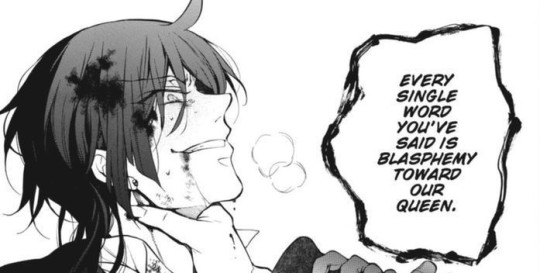
Even when August is literally choking him, and Vanitas is clearly in pain, his smile stays on, unwavering, from the beginning to the very end of his interrogation. Later, August himself even acknowledges that he himself couldn’t discover shit about Vanitas after all, since Vanitas is so well guarded.
His smile also serves another purpose other than to omit, and it’s exactly to extract information from other people.
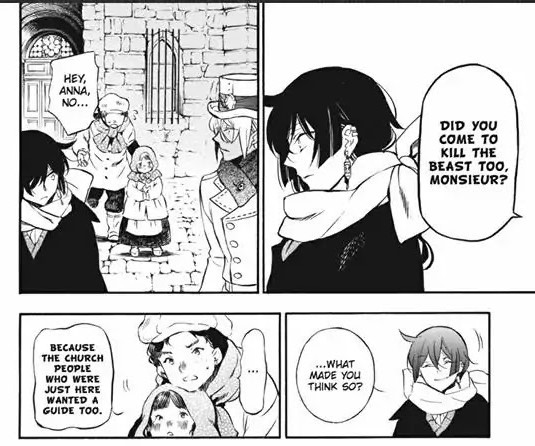
Vanitas relies a lot on charm and charisma to gather information. He knows people are more willing to talk to someone friendlier, who wears a smile on their faces all the time and to who they can feel a sense of security and trust towards.
Based on this, it’s pretty safe to assume that with Noé at first was the same, wasn’t it? His enthusiasm at the beginning never really existed (although I still believe his instant interest towards Noé is pretty real, like he gravitated towards him). He uses his smiles to conceal, to gather information and also to taunt people (e.g. Astolfo), but it’s not truthful.
For me, Vanitas’s sudden “change” was one of the biggest proofs of his trust on Noé, and marks the beginning of when he truly started to see him as someone he could (kind of) confide in. You could argue that Vanitas jumping in the Altus portal was also a sign of trust, but I disagree. That still felt weirdly “calculated”, he knows someone with a personality like Noé’s would never let someone die in front of their eyes, so he gambled on this possibility. Vanitas trusted his own understanding of Noé’s personality, not Noé himself. However, what would he even gain by acting grumpy next to Noé? Nothing, right? He’s just exposing himself needlessly.
Now the question, what exactly sparked this sudden change in the way Vanitas felt about Noé? For the when, I think it’s pretty obvious what scene it was.
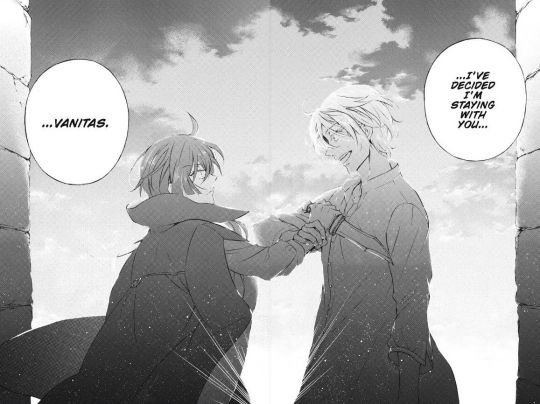
This scene is very important for many reasons. Each of Vanitas’s expressions here tell their own story and capture the nature of his contradicting feelings so well. But, I’ll get to these “contradictions” in a second, now I wanted to talk about something else: “hope”.
It’s no news to anyone that Vanitas is like, depressed as shit and is pretty much passively suicidal and, of course, entirely disillusioned with the world and society as a whole. He believes people and vampires alike are inherently selfish, twisted beings. Creatures so wicked that there is no point to even reason with them. Vanitas doesn’t have any hope whatsoever, both in himself and others. For him, the person is already drowning before even stepping into the lake.
Even so, I firmly believe that there is a side of Vanitas that wished so fervently to be proven wrong. Even though he was dead set on his beliefs, he wanted someone to come and crush them. To prove him that there is good in this world, that he was being a damn fool this entire time. But no one ever stuck around enough to do that. They were all unable to truly reach out to him.
Noé gave him the hope that there was a person who could convince him. That there was a person who could understand him, reach out to the depths of his heart and get past his lies. He willingly sets up this façade of this cold, unfeeling jerk who has no care for others and always does as he pleases, but he’s always wanted someone to look past this. Yet, at the same time, he’s deathly afraid of this possibility.
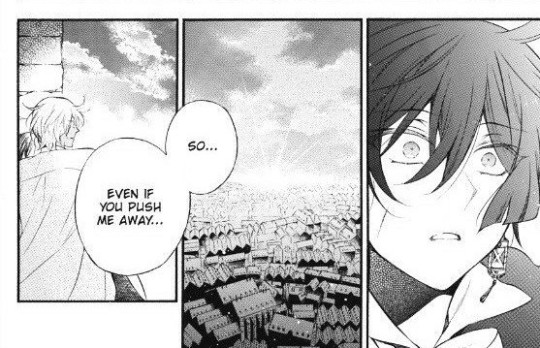
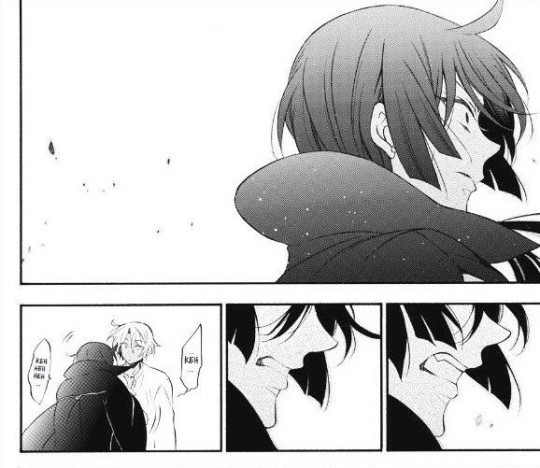
In the first picture, his face is in awe, as if he was looking at salvation itself. However, that all crumbles down when Noé says he is staying with Vanitas and the implications this has. That’s what he is terrified of. Aaaand with this we move to the second section of this analysis! (Damn this is getting so lengthy I truly became that one freak who writes a thesis worth of analysis of a drawing).
2. Vanitas’s fears and contradictions:
I think it’s really obvious to everyone that damn this dude got some issues regarding forming relationships with other people. It’s pretty safe to say the only friend he has is Noé, and that’s such an easy thing to overlook, mainly because of how he acts around others. You could argue that he’s friends with Dante but… that’s not quite so. Dante is, in fact, fairly good at reading Vanitas (which, unpopular opinion, is not a hard thing to do given how emotional he is, but let’s get to that later) but between them there is an emotional barrier neither is willing to cross. They’re more like close acquaintances than anything.
Well, this isn’t groundbreaking, but it’s pretty obvious Vanitas is terrified of forming any meaningful bonds with others. Thing most obviously showcased in the notorious chapter 12:
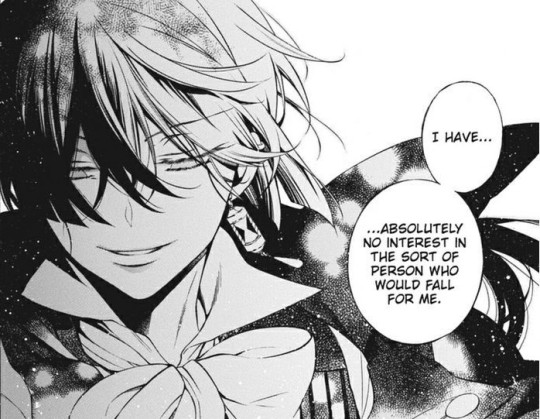
This panel… is a tricky one. It’s totally up to the reader’s interpretation and it could mean a myriad of different things, especially since very little was revealed about his past as of chapter 39.
I personally see this scene as showing Vanitas’s fear of attachment, laced with a tinge of self hatred. There is nothing Vanitas fears more than getting close to people and caring about them, he himself sees this as a weakness and something he absolutely must not have. On a side note, it is also possible that Vanitas thinks so lowly of himself that he thinks anyone that would seriously love him was completely out of their minds. Or both, who knows?
But what is so interesting is that… he can’t. Vanitas knows he should be cold, calculating, use people as pieces and discard them, knows he shouldn’t be emotional or act on impulse, knows he shouldn’t express any kind of feeling whatsoever and keep the concealing smile. Yet, he just fails so miserably in every single one of those. Vanitas cares a lot, more than he’d ever want to admit, he does completely reckless and uncalled for things for no reason other than it pissed him off, so of course he gotta get the last say because he has the mind of a teenager on their rebellious phase.
Say, can you think of any, any at all, conceivable explanation of what Vanitas could possibly gain by making that speech for all vampires to hear during the ball? There is none. If you think from his perspective, the only thing that little spectacle of his brought were disadvantages for himself. So why? Because he felt belittled, humiliated, and he’s prideful as all hell, so of course he had to prove how none of that was even remotely true. He wanted to affirm himself. In the thinking process of a cunning, one hundred percent unemotional man, that was a completely unnecessary move.
It’s almost like Vanitas wants to become someone he’s not. He wants to act a certain way (to prevent even more pain?), but, ultimately, he cannot. It’s even funny how he fails spectacularly on keeping his expression “blank, without information” because even when he tries, his emotions all show on his face. It’s amusing how quick he is to try and cover said blunder with a laugh and a smile.
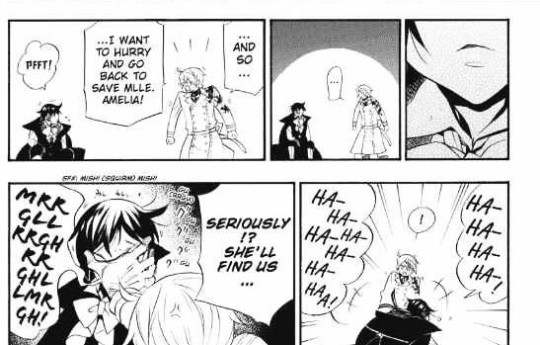
These contradictions are very deeply linked to his trauma, even if we don’t know the full extent of it it’s fairly obvious. What drives his wish to act so differently and thus his contradictions is, most of all, fear.
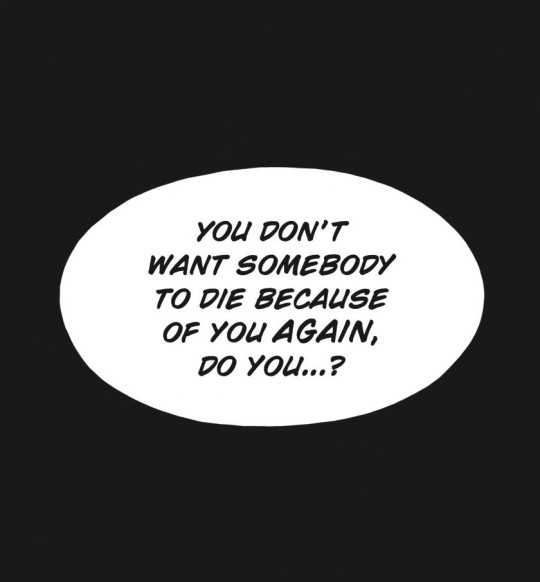
This part is pretty straightforward, in fact. In the end, Vanitas is afraid of forming bonds with others in fear of losing them, he knows firsthand how much it hurts (of course, he also doesn’t want anyone to discover his past). But that’s not all, remember how I mentioned that Vanitas’s expression only darkened in the clock tower (chapter 11) scene when Noé said he had decided to stay with him…? Well… I think Vanitas might think he brings misfortune to whoever gets involved with him. Like he is some symbol of disaster and doom that does nothing but kill those around him. If people care for him, they will suffer, but if they hate him, they will be completely fine.
Despite his insistence of being detached to all people and being a cold asshole because that’s what he must do, to avoid getting hurt, to avoid having weak points, he also craves so very badly for intimacy. He wants to be close to someone, to make an impression on someone. After all, during his whole life I doubt he truly had any meaningful relationships with others. But love only results in pain in the end, so what other strong emotion is left? Of course, it’s hatred.
Aaand this brings us to the last section of this analysis! May be a tad biased and controversial, but as I said, this is merely my opinion and I’m just as much of a random person on the internet as you! My opinion is no better than yours.
3. Vanitas’s relationships: Mainly Noé and Jeanne
As I said above, Vanitas wishes fervently to have some kind of relationship with someone, no matter which type. Since love is a no-go, he opted towards having someone feel intense hatred towards him. Because a strong emotion is a strong emotion, isn’t it? After all, hatred must be better than indifference.

Getting this out of the way, I do not think Vanitas truly loves Jeanne as of chapter 39. It’s glaringly obvious he does not, his way of showing true affection is not the way he does with Jeanne. The way he acts around her is much closer to the façade he tries to be. As I see it, this ties into Vanitas’s wish to explore intimacy and affection, even if a broken, twisted kind of. Another proof of this is that he doesn’t push her away like he does with people he knows he’s starting to grow fond of, but instead keeps her closer.
That is exactly due to the belief that she will always, always hate him, and so, there is absolutely nothing to fear. He can explore all these things and experience being the brunt of a person’s intense feelings without any consequences.
This is a very harsh thing to say, but I think Vanitas is using Jeanne as a “convenient female” he accused Dominique of being to Noé.
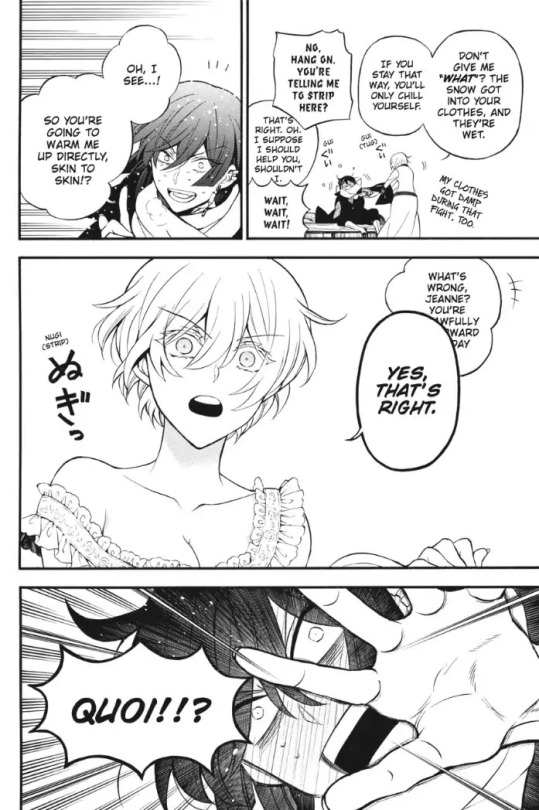
It’s also worth noting that in the one chapter he truly got somehow intimate with Jeanne he tried to avoid it in many ways, even trying the usual “flirting” to purposefully gross her out. By the way, can I just point out that this scene truly shows just how estranged from affection he is? He has none of the suave façade, he’s a blundering mess.
About the topic of whether Jeanne likes Vanitas or not, my answer is, too, a clear no as of chapter 39. Vanitas and Jeanne together are a combination that spawns all the disaster on earth, considering how manipulative and emotionally stunted Vanitas is, and how gullible and affection starved Jeanne is. It’s a recipe for disaster. Jeanne is not used to affection, she was mistreated during most of her life, treated as something below humans and vampires due to a thing that was completely out of her control, and then, melting at any sort of affection, no matter how twisted the person may be.
To be fair, I think overall Vanijeanne will develop immensely, and their relationship will grow into something else, more healthy? Who knows! I just think it’s undeniable that in the future Jeanne will have a big, big impact on Vanitas and vice versa. (Disclaimer: I will not tolerate any ship hate whatsoever and everyone is allowed to ship whatever they want regardless of the nature of said ship).
Shifting the focus away to Noé and Vanitas for now, there are some little things I would like to talk about and juxtapose with Vanijeanne, since parallels are my thing.
Parallels between Vanoé and Vanijeanne may not even exist and are just my mind overthinking (hell if this whole post isn’t just a big overthinking) but I would like to talk about what my sleep deprived mind came up with. First off, I think it’s safe to say that Vanoé’s relationship is depicted as complete opposites, opposite worldviews, personalities, fuck even color palettes! And the story as it is shows that they bring the absolute best out of each other and learn by staying by the other’s side. The whole narrative pushes the two halves of a whole idiot a lot.
Noé is naive, pure, idealistic but still possesses certain “selfishness” (like how he felt he was selfish when Louis died but he lived), while Vanitas is cunning, wicked, cynical and would throw his own life away for one corn chip. It’s like they were two people fated to meet.
Vanitas and Jeanne, on the other hand… are kind of similar, but only in certain ways, mostly due to trauma. Jeanne, too, only lives for a sole objective, the same way Vanitas clings to life using his self assigned duty to cure curse bearers. Jeanne and Vanitas both, are people who have essentially gave up on life, on the world, and on themselves. People who purposefully push themselves away from happiness, in fear of the consequences.
I think, at least right now, this is the main reason why they cannot see eye to eye (aside from Vanitas being an asshole). To understand Vanitas and reach out to him, one must see him with “love”. Without love, Vanitas’s struggles, trauma and suffering cannot be seen. If you look at him with eyes full of hatred, he’ll be exactly who he wants to be seen as; a cold, heartless bastard who toys with people and cares for no one other than himself. Jeanne doesn’t have the ability to see the world as purely as Noé does. She cannot find love even in seemingly irredeemable people such as Vanitas. Yet, at least.
That’s the main reason why I think Vanitas isn’t afraid of being near Jeanne, and that’s the main reason why Noé is probably such an… illogical existence to Vanitas. Vanitas, too, cannot see love in the world, and yet, Noé does. Noé catches every single small detail about him:
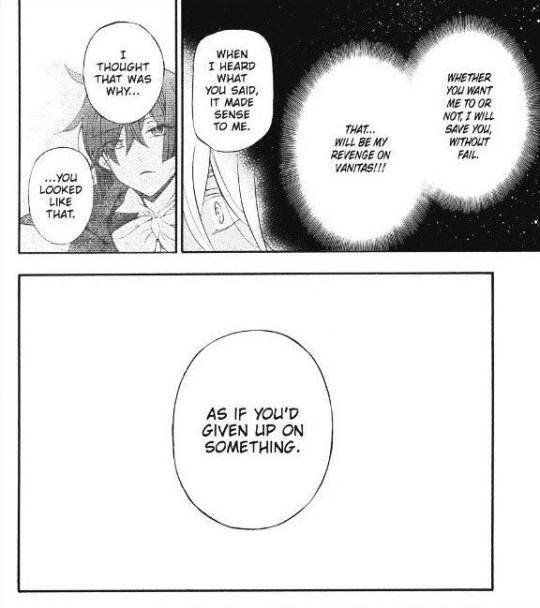
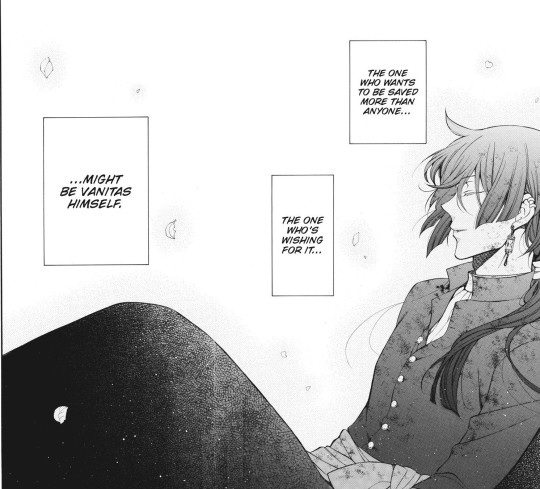
Whew! That was… one big fucking post! If you’ve reached this point, thank you! I write meta for fun only and to share my interpretations for you guys! Also, the last bit probably sounded very ship hate-y but I swear this was absolutely not my intention.
Actually, the true meaning of this whole post was that I wanted to make an Umineko reference with Vanitas no Carte and I have succeeded. Play Umineko, you guys.
#vnc vanitas#vanitas no carte#vnc#the case study of vanitas#meta#vanoé#vaninoé#vannoé#analysis#long post#vnc jeanne#noé archiviste
438 notes
·
View notes
Note
this has been a strange start to the new year for sure. how are you doing? what did you think of the situation in the capitol? any thoughts or worries about the rest of the month? I'm curious to hear your thoughts on everything. -🌙
thank you so much for the ask💞 almost every day I check my inbox anticipating the next time I'll hear from you. just knowing that someone cares.... it really does a lot for my self-esteem. I don't have many friends right now and the few I do are very busy and have a lot of things they would rather do than talk to me. thank you for making time to listen to me and ask me how I'm doing. you wouldn't believe how many people don't. I haven't always been the most consistent presence for you and I'm sorry. I'm trying to do better and be less selfish because I know how it feels to be on the receiving end of that. thank you for always being kind to me, pen pal.
there is a lot I want to say regarding the capitol and the situation in the country in general. as a social science student (and hopefully one day a professor!) these situations are of great academic interest to me. as a bisexual woman and an informed US citizen who cares about my rights I am also very personally vested in American issues. but first I would like to tackle your question regarding how I'm doing:)
I'm doing pretty good. classes have started back up but most of mine are online. I'm thinking of switching to online exclusively because of how much emotional (and sometimes physical) labor in-person classes are, and also for the sake of my health and my parents'. it's funny how so many things we did with ease before the pandemic seem so burdensome now. even small interactions are anxiety-inducing now, and I find myself having a hard time socializing even casually. like a muscle that has atrophied without use, my social skills are awful now. on a happier note, my productivity and creativity are both at all-time highs since social interactions aren't using up all my energy anymore. I brought my record player to my dorm room and I've been listening to a bunch of music, I've also been writing and recording some music of my own. I have a couple of demos and if you or anyone else is interested, I'll post them on here. once I record and edit full band versions I'll put them up on my soundcloud. I've tried sharing some of my stuff with some friends but none of them really care and I don't want to annoy them. besides, it's more for myself anyway. I wang to prove to myself that I can make music and that I can say something worth saying. a lot of my struggle over the past 6 months has been that I feel as though nothing I do or say can change anything, that none of my actions matter. I struggle a lot with control and I've been working on it for years, but it's still really hard for me. anyway. I'm enjoying class and what I do outside of it. I've been in my element living alone again (in my dorm) and feeling free to wear/do/say what I want, when I want. I wash my dishes and sing to myself and manage my time and drink lots of artificially sweetened and heavily flavored coffee without anyone around to judge me. and I get to cry and masturbate when I want, both of which are helpful in regulating my moods. I don't know. it's not like I'm doing anything exciting, but I am doing each thing I do well and with a happy heart. I feel like this portion of my life is something of a hibernation- the winter seasons combined with the pandemic have me in a cozy little daydream, reading and self-reflecting and getting back in tune with myself and my passions. I have a feeling that the spring and summer will be very vibrant bustling months so I am trying to enjoy my rest and soak in as much knowledge about myself and the world around me as I can. it's hard for me to live in the present and not get antsy (connected to control issues, I think) but I'm getting better at it. on the subject of the future, I've also been using this time to look into grad school and prepare for the GRE (a standardized test required for most grad school applications, similar to the ACT/SAT). I'm learning a lot that I didn't know since neither of my parents went further than undergrad, and I'm getting excited. I'm really looking forward to doing research. I've already been collecting some thesis ideas for an undergraduate-level thesis that I have to complete next year for the honors college, and hopefully I can turn that into a masters and/or PHD thesis when the time comes. now, on to more important matters than my silly little life.
I have very complicated feelings about america. I do have some attachment to some of the original ideas that are at the foundation- "bring me your huddled masses...", "all men are created equal", the general spirit of democracy, etc.- all of these are valid and worth keeping (in some form) to me. I think a lot of good people and ideas exist around us and I believe that we must be as empathetic and kind as possible to one another in order to navigate the current climate and preserve the good that we do have. that said, america was also founded on some pretty terrible, bigoted principles and our history- as well as our present- is marred by injustices. our society has become highly individualistic because of capitalism, and it has resulted in considerable division on every level. the competition that fuels capitalism is like an invasive species of plant, it does not only exist within our economy but it slithers out into our social world and the way we relate to others. I think capitalism coupled with our post-enlightenment founding is the source of most all of our problems as a country. capitalism has taken root in america in a way more malicious and all-consuming than in any other culture, because it was there at the beginning of our country and all of our social norms have grown out of it. many other cultures have existed long before capitalism and though it has modified their culture, it has not altogether become it. because america was founded on capitalism, we have no cultural identity outside of it. america is, itself, capitalism. that is precisely why america is experiencing all of the best and worst parts of capitalism at their most extreme. it is why, as I mentioned previously, we are perhaps the most divisive and competitive society in the modern world, and probably in history. we are the richest and most powerful country but we have the largest wealth gap and incarceration rate, among many other extremes.
all of this is to say that the rise of Trump and fascism in this country has been a long time coming, and unmistakably inevitable. to defeat it we will have to break america down to its fundamentals, throw out everything that is unethical and unjust, and rebuild our entire society from there. this is radical and hard to imagine, it will also be very difficult to execute, but I strongly believe that much of our societal systems just cannot be reformed, they must be thrown out and replaced.
the capitol riots were inexcusable and sickening but decidedly inevitable. this has been steadily building for america's entire existence. I think it will get worse before it gets better, as there are already plans for bigger and more numerous protests across the country in the following weeks. that said, I feel hopeful as I see the anti-fascist movement grow in the wake of fascism, I am hopeful as I see many people being radicalized and awakened to the realities of this country's failings. I don't know how exactly we will even begin to rid ourselves of the biases, prejudices, and downright hatred that plagues our country. I don't know how we will relate on an individual level to those with such deeply-ingrained hate in their hearts. I don't know how we will change our systems of government and economy to reflect new cultural values that we begin to build together. I am not sure what the future will hold. I do believe, however, that we will triumph over this moment and that the future will be better. I think that the only way to radically change and unite so many vastly different people and remove the blinders from their eyes is through a terrible, historic awakening like the one we are having now. the situation itself is awful, but I am hopeful that out of this mess we become a nation more committed to justice and to some of the ideals which we have falsely claimed to be emulating for our entire history.
so yes, I am worried about the next few weeks, months, and even years. there is no end to the pursuit of a just society, and I think every informed citizen is always a bit apprehensive about certain aspects of their culture. there will always be problems to combat and injustices to rectify, but I think that we will soon be moving to a better place, that we will remember these moments and say, "never again". I am hopeful, despite seeing some of the worst of humanity in recent days, that these atrocities will bring positive change.
I know that was long and instead of discussing issues about the capitol, or even just current political issues, I expanded the scope considerably and dragged in a lot of things from history and grander sociopolitical theories. still, I think it is hard to talk about the insurrection attempt without talking about a lot more. thank you for reading my takes and caring about them. I spend a lot of time thinking about these things, and it feels nice to share them with someone other than my annoyed professors who want me to shut up so they can finish the lecture and stick to their semester schedule.
I hope you're well and that you're staying safe and healthy. are you in school now too? have you or your family had the virus? thank you for coming to talk to me, I always enjoy it. I'll talk to you again soon💞
2 notes
·
View notes